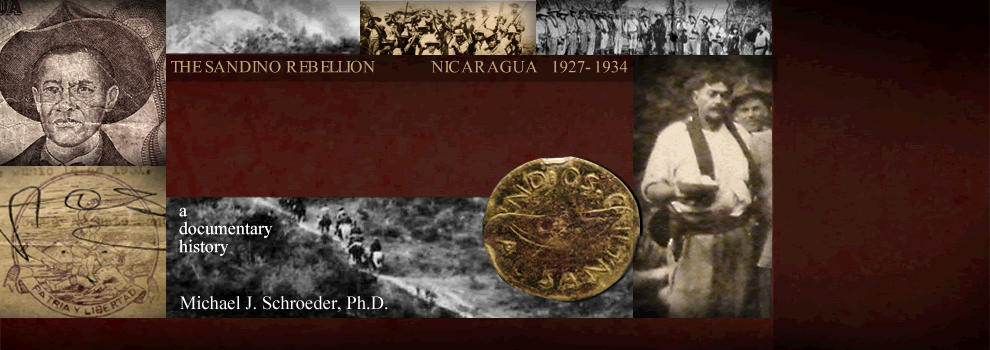
 |
|
M —
D O C S: M I S C E L L
A N E O U S D O C U M
E N T S |
|
thru 1927 |
1928 |
1929 |
1930 |
1931 |
1932 |
1933 + |
|
1
|
2
|
3
|
4
|
5
|
6
|
7
|
8
|
9
|
10
|
11
|
12
|
1
2
3
4
5
6
7
8
9
10 |
1
2
3
4
5
6 |
7
8
9
10
11
12 |
1 2 3 4 5 6 |
7 8 9 10 11 12 |
1 2 3 4 5 6 |
7 8 9 10 11 12 |
1 2 3 4 5 6 |
7 8 9 10 11 12 |
1 2 3 4 5 6 |
7 8 9 10 11 12 |
1 2
3 4 5 6
7 8 9 10 |
|
THIS IS THE SECOND
PAGE
of the M-DOCS
(Miscellaneous Documents) pages, covering the period from
March 1917 through the
year 1924. The page
is in progress.
This website project is indebted to Mr. Brandon
Ray, Summa Cum Laude college graduate
from Ashford University in Iowa (with a B.A. in
History and a minor in Political Science) for
his meticulous transcriptions on this and many
other pages.
Critical introduction forthcoming.
|
|
|
|
|
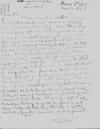
|
March 15, 1917.
Jack Lemann, Waunta, Nicaragua, to "All," p. 1.
transcription
forthcoming. (From the
Lemann Family Papers, Tulane University:
http://specialcollections.tulane.edu/archon/?p=collections/controlcard&id=102).
|
|
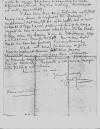
|
March 15, 1917.
Jack Lemann, Waunta, Nicaragua, to "All," p. 2.
transcription
forthcoming.
(From the Lemann Family Papers, Tulane
University:
http://specialcollections.tulane.edu/archon/?p=collections/controlcard&id=102).
|
|
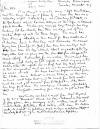
|
March 20, 1917.
Jack Lemann, Waunta, Nicaragua, to "All," p. 1.
transcription forthcoming.
(From the Lemann Family Papers, Tulane
University:
http://specialcollections.tulane.edu/archon/?p=collections/controlcard&id=102).
|
|
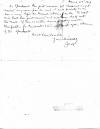
|
March 20, 1917.
Jack Lemann, Waunta, Nicaragua, to "All," p. 2.
transcription forthcoming.
(From the Lemann Family Papers, Tulane
University:
http://specialcollections.tulane.edu/archon/?p=collections/controlcard&id=102).
|
|
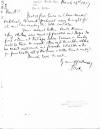
|
March 23, 1917.
Jack Lemann, Waunta, Nicaragua, to "All."
transcription forthcoming.
(From the Lemann Family Papers, Tulane
University:
http://specialcollections.tulane.edu/archon/?p=collections/controlcard&id=102).
|
|
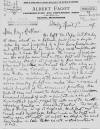
|
April 7, 1917.
Jack Lemann, Waspook on the Río Coco, to Jack
Arthur, p. 1.
transcription
forthcoming. (From
the Lemann Family Papers, Tulane University:
http://specialcollections.tulane.edu/archon/?p=collections/controlcard&id=102).
|
|
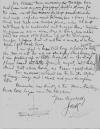
|
April 7, 1917.
Jack Lemann, Waspook on the Río Coco, to Jack
Arthur, p. 1.
transcription
forthcoming. (From
the Lemann Family Papers, Tulane University:
http://specialcollections.tulane.edu/archon/?p=collections/controlcard&id=102).
|
|
|
|
|
|
|
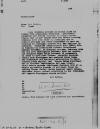
|
February 26, 1920.
Telegram from USS Tacoma to Opnav.
"X-71 ¶ 1-42o7 ¶ McC
¶ TRANSLATION ¶ From: USS TACOMA. ¶ To: Opnav ¶
1021 Honduras aroused by recent raids by rebels
from Nicaraguan territory. Government requested
our acting Minister to inform United States that
it now learns that the rebels invading Honduras
have been armed by Nicaragua and to inquire
attitude our State Department in case revolution
in Nicaragua concurs with war declared by
Honduras. Telephone communication with
TEGUCIGALPA temporarily interrupted however
interviewed General Cristmas [Christmas?], an
American citizen, February 20th who left
Tegucigalpa February 20th and martial law
declared Teguc Galpa [Tegucigalpa?] February 19
presumably in order to mobilized [mobilize]
forces. Reported Honduran rebels from Nicaraguan
had captured three towns and Government put
Municipal authorities in which located under
martial law. Troops being mobilized but no
disorder Tegucigalpa but some unrest. About
twenty persons imprisoned February 20th at
Amapala apparently because of political views
including former United States consular agent
Zalaya. Christmas thinks present revolution is
not formidable but regards Nicaraguan menace
serious. ¶ USS TACOMA. ¶ 19 ¶ oo ¶ 1o ¶ 11 ¶ 12
¶ 13-ORIGINAL ¶ ONI ¶ 2-26-20 ¶ Note:- This
message has been serviced for correction."
|
|
|
|
|
|
|
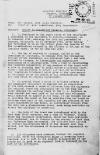
|
1.
January 27, 1922. "Report on Conditions,
Managua, Nicaragua." Captain M. M. Taylor,
Commandant, 15th Naval District, Managua, to
Chief of Naval Operations, Navy Department, p.
1.
"AMERICAN LEGATION ¶
Managua, Nicaragua ¶ 27 January 1922. ¶ From:
Commandant, 15th Naval District. ¶ To: Chief of
Naval Operations, Navy Department. ¶ Subject:
Report on conditions Managua, Nicaragua. ¶ 1. In
obedience to the radio order of the Department I
proceeded in the GALVESTON to Corinto,
Nicaragua, on 16 December 1921, arriving the
19th and proceeded to Managua, Nicaragua, on 21
December 1921, after having had forwarded to me
at the former place the results of the
investigation ordered by the Officer in Command
of the Legation Guard, as far as they had gone.
¶ 2. The day of arrival at Managua, called on
the President of Nicaragua, in company with the
Commanding Officer of the Galveston, and
explained that I had been ordered to Managua, to
investigate the unfortunate occurrence of 8
December 1921 with a view to determining the
possible culpability of any members of the Guard
with a view to bringing them to trial before a
Military Court, which I was empowered to order,
and that any assistance the Nicaraguan
Government could give in the procurement of
testimony or as the result of any investigation
they had made would be greatly appreciated. ¶ 3.
On arrival found a board of officers ordered by
the Commander Detachment in session and on
completion of its work ordered a board of
Officers from the GALVESTON. The original board
had originally met at the Camp and later changed
its meeting place to the U. S. Legation as some
comment had been made to the effect that
witnesses would hesitate to appear at the Camp.
It was thought better to separate the board as
far as possible from the Guard so meetings were
held at the Legation and the officers of the
board quartered at the hotel, an interpreter
brought from the ship and a stenographer hired,
none being available on either the GALVESTON or
ASHEVILLE. ¶ 4. The work of the board was
interferred [interfered] with by the fact that
23-25 December, was a time of “fiesta”, during
which the centenary celebration, which had been
postponed from September, due to trouble in the
country at that time, and Christmas then
celebrated. The officers were invited to certain
celebrations which it was thought best they
attend, and the attendance of witnesses was
impossible to secure. ¶ 5. All witnesses were
summoned through the Legation Officials. There
was throughout delay in securing their presence,
due in part to the natural dilatorniess
[dilatoriness] of the people and in part to an
apparent lack of interest on the part of the
Government. . . . "
|
|
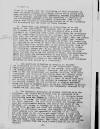
|
2.
January 27, 1922. "Report on Conditions,
Managua, Nicaragua." Captain M. M. Taylor,
Commandant, 15th Naval District, Managua, to
Chief of Naval Operations, Navy Department, p.
2.
" . . . There is no
doubt that the attendance of such witnesses as
were requested through the Foreign Officer could
eaisly [easily] have been assured but it
required constantly renewed requests, and
finally personal letters from the Secretary of
Legation to the individuals desired to secure
attendance. Some of the papers were helpful in
publishing notices as to the necessity for
attendance and the names of those desired. ¶ 6.
There were many rumours in circulation as to the
cause of the disturbance, statements that it was
caused by the Liberals as opponents of the
government with a view to discredit it;
circulars were issued criticizing the government
for not permitting attacks on the marines, but
for protecting them when the mob had collected
after the fight; when the papers were allowed to
carry the occurrence as a news item, attacks
were made for the imposing of silence at first,
for permitting the marines to be tried by their
own courst [courts] under the principle of
exterritoriality rather than in the local
courts. Much of this criticism was undoubtedly
caused by a desire to attack the government
rather than by any regard for the dead
policemen. After the board of investigation had
started its work, every facility was given the
papers to obtain news. Considerable space was
given the deliberations of the board, at times
the board was criticised, and on one occasion
where a native witness testified in favor of the
marines, one paper commented adversely on such
action by a Nicaraguan. ¶ 7. The political
situation is roughly as follows: The Government
is in the hands of the Conservative Party,
comprising probably one-third of the people;
this party has its headquarters in Grenada
[Granada], Nicaragua, and has as members most of
the old established and wealthy families, with
their dependants [dependents]. The remaining
two-thirds form the Liberal Party compromising
many of the liberal professions, artisans and
laborers, their headquarters are in Leon. It
would seem that the rivalry between the two
parties is inspired as much by the rivalry
between the two districts, a rivalry existent
since the days of Spanish rule, as by any
difference in political principles. The two
parties are frequently referred to as Grenadinos
[Granadinos] and Leonistas. ¶ 8. The financial
situation is closely involved with the
political. The Conservative Party made an
agreement with certain New York banks, Brown
Bros., and J.W. Seligman, which practically puts
the financial control of the country in the
hands of the banks. The banks have established
and control, the Banco Nacional, the sole bank
of issue and through which pass all governmental
monies; own 15% of the stock of the railroad,
and manage it through the firm of J.J. White &
Co., of New York; collect and allot the customs
revenue; and through an affiliated concern, the
Companis de Ultramar, enter largely into the
commercial business of the country and loan
money on the coffee and sugar crops, a large
part of which they control. This financial
control by the foreign bank is much resented by
the Liberals and by some business men with whom
I have spoken. They claim, amongst other things,
that all profits from the bank’s activities go
out of the country. . . . "
|
|
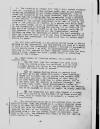
|
3.
January 27, 1922. "Report on Conditions,
Managua, Nicaragua." Captain M. M. Taylor,
Commandant, 15th Naval District, Managua, to
Chief of Naval Operations, Navy Department, p.
3.
" . . . 9. The
majority of people with whom I have spoken
consider that the withdrawal of the marines
would lead to the almost immediate overthrow of
the Conservative Government. Many of these are
employees of the bank branches, some are
business men and one was a mining man who
represented large interests in the country. It
is also generally considered possible that
overthrow of the present government would lead
to loss by the bank of its position of control,
to a number this would seem to be a good thing,
as it is considered by them, that the bank by
its operations is hurting the country. It is
difficult to say how much sincerity there is in
the Liberals [Liberals’] criticism of the
presence of the marines and the Conservatives
Parties [Party’s] reliance on them for retention
of power; the fact probably is that the Liberals
would like to see them withdrawn until they had
seized the government, and then have them to
retain themselves in power. ¶ 10. All this
political and financial unrest leads to bitter
attacks on the Government, and the marines are
used as a means of such attack. The Government
permits a freedom of expression in the papers
which I am told, is unprecedented, and such
articles as they present to their readers,
especially the more ignorant ones, cannot but
have a great effect in promoting dislike of the
marines. ¶ 11. Other causes of friction between
the marines and natives are: ¶ (a) The fact that
the marines have more money than the native
police and soldiers, and can more eaisly
[easily] secure the favors of the prostitutes
with which the place seems to abound. ¶ (b) The
racial feeling which is present here as well as
in any place with which I have knowledge, where
our enlisted men are thrown into contact with
the Latin American. The existence of this
feeling is less warranted here than in other
places, due to the fact that the natives in
western Nicaragua, have little black blood,
being predominately Indian and Spanish. A black
man is very rarely seen in the streets, and to
be classed as black, or negro, is highly
resented. ¶ (c) The cheapness and easy
procurement of a cheap and vile liquor in the
hundreds of cantinas about the town, each of
which has as an adjunct, a number of
prostitutes. ¶ 12. The conditions under which
the marines live, is most unsatisfactory. They
are cooped up in a small compound where there is
no room for drill or for a base ball diamond.
Their quarters are none too comfortable, being a
sort of lean-to against the wall of the
coumpound [compound], from which the dust so
prevalent here in the dry season cannot be
excluded. Once outside the gate, ten minutes
will avail to see all that is worth seeing in
the town. . . . "
|
|
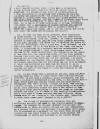
|
4.
January 27, 1922. "Report on Conditions,
Managua, Nicaragua." Captain M. M. Taylor,
Commandant, 15th Naval District, Managua, to
Chief of Naval Operations, Navy Department, p.
4.
" . . . A band
concert several times a week and an occasional
moving picture show, form the total of decent
means of amusement. The record of the board of
investigation is a long recounting of wanderings
from cantina to cantina, all dirty and
unattractive. The result has been that the
marines on liberty have been thrown into close
contact with the lower class natives, and the
causes of friction noted above have had full
opportunity to work. The row of 8 December,
1921, was a result of such conditions of living.
Investigation shows that a succession of fights
between the marines and police, where the latter
were in superior force or where the marine was
drunk, led to the men taking the matter into
their own hands and attacking the police. ¶ 13.
It does not seem to me possible, with conditions
as above stated, to entirely do away with the
possibility of such occurrences. Such can,
however, be largely ensured against by removing
the marines from their present situation to one
more isolated, and where can be obtained the
space for drill and recreation. Such a place
was, I am informed, at one time considered. It
is on the shore of the lake, has ample room, is
surrounded by a sparsely settled neighborhood,
and the new houses erected in this neighborhood
could be controlled by the local authorities,
its situation on the shore of the lake with the
prevailing winds off the lake ensures freedom
from dust, and the lake itself offers
opportunity for boating and swimming which are
not now existant [existent]. Its great
advantages are the removal from a congested
district and the additional possibilities for
providing the men with amusement in their own
territory and removing the desire to go on
liberty. Pending the above removal, steps will
be taken to enlarge the part of the Campo de
Marte now occupied by the Marine Detachment. ¶
14. It was found that a number of the men, some
15%, were keeping women in town, a large number
were non-commissioned officers. In one case a
corporal, since discharged, was running a
cantina or restaurant in the town, in his native
wife’s name, which gave the marines credit and
was considerably patronized. The radio gunner,
through his wife, was running a public garage,
and has left the country owing considerable
money. Such practices cannot but have a bad
effect in that they give those participating in
them too great an interest outside the Camp. The
evidence of the board of investigation shows
that some of these non-commissioned officers,
whose houses were in the vicinity of the trouble
shut themselves in with their women until
brought in by a patrol. ¶ 15. The record of
punishments indicates that not sufficient
severity was used in the discouragement of
drunkenness. For example: the Gunnery Sergeant
was punished for drunkenness on three successive
months and then transferred as a Gunnery
Sergeant. One sergeant was punished three times
for drunkenness as a sergeant and the third time
reduced to corporal; he was later tried by
general court-martial for drunkenness on patrol
and returned to the United States. . . . "
|
|
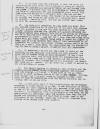
|
5.
January 27, 1922. "Report on Conditions,
Managua, Nicaragua." Captain M. M. Taylor,
Commandant, 15th Naval District, Managua, to
Chief of Naval Operations, Navy Department, p.
5.
" . . . 16. It
appears from the testimony before the board of
investigation that there were a number of cases
of trouble between the marines and police of
which not sufficient note was taken. It appears
that the continuance of these fights and lack of
protection the men considered their right, led
them into the affair of 8 December 1921. One man
private Zollner, U. S. Marine Corps, was beaten
by the police while on liberty and drunk on the
night of 7 December 1921, again on liberty 8
December 1921, nor had the matter been taken up
with the authorities. ¶ 17. Men have been
permitted to stay here too long. That the
present condition is in part due to the fact
that grudges were not allowed to die out but
were carried on by the long timers, grudges
against the natives and against officers who
relieved others less strict. This cannot be
proven by evidence, but is an opinion soon
formed by me and commented on by other
experienced officers. A man who for a long time
has slept every night with his woman resents
being made to spend his nights in Camp, and it
is my opinion that some of this resentment is
responsible for present conditions. Fifteen
months should be the limit of a man’s stay here,
the conditions are too demoralizing for him to
remain longer, no matter what his importance. ¶
18. No systematic effort has been made to check
up the character of the cantinas with which the
town abounds, and place out of bounds those of
evil character. In the affair of 8 December
1921, the meeting where the organization for the
fight took place was in one cantina and the
attack took place at another. This second was of
bad character and should have been out of
bounds. Nor was there any patrol to assist in
the preservation of order. ¶ 19. The racial
feeling is strong in this vicinity and the
people greatly resent being considered negroes.
The greater part are Spanish and Indian, a black
face is not as often seen as in most Northern
Cities of the United States. Calling them
“spigs” and “niggers” leads to intense dislike.
Much could be done by association with the
better families and including them in social
life. ¶ 20. In the early part of the
investigation the Government expressed no great
desire to assist; it was difficult to obtain
witnesses and their presence was only secured
after many requests, by the aid of the papers
and by letters to individuals from the Legation.
Conservations with the employees of the bank, as
are practically all Americans, gave the opinion
that they did not relish the investigation for
fear that it might lead to the withdrawal of the
marines. There was little aid obtained from
sources which should have been helpful. . . . "
|
|
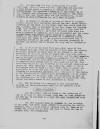
|
6.
January 27, 1922. "Report on Conditions,
Managua, Nicaragua." Captain M. M. Taylor,
Commandant, 15th Naval District, Managua, to
Chief of Naval Operations, Navy Department, p.
6.
" . . . 21. Men
selected for duty here should be chosen with
care, both officers and men. Life here for too
long a time brings about a lowering of morale
due to the surroundings, the constant preaching
of the “outs” as to the venality and rottenness
of the government, the cheapness of the vile
liquor sold and the immoroality [immorality]. No
man subject to such influences but will come to
grief. ¶ 22. As stated in action on report of
board of investigation charges were preferred
against two men, whose identification seemed
best. It was hoped that this would show the men,
already kept in suspense by the long drawn out
proceedings, that something had been developed
and they were not safe, and to use this in an
effort to break down some one with a promise of
immunity. This was successful and two
participants made confessions under promise of
immunity. The result of this will be made
subject of a separate report. This step was
taken as it was apparent that there was a
concerted effort on the part of the enlisted
personnel to prevent any action and it seemed
the only way to circumvent this. ¶ 23. In view
of the fact that one major cause of the
condition that has grown up appears to have been
the passing on of old grudges by those long on
the ground to the new arrivals, so that the
sense of injury was gradually growing, it is
necessary to break this tradition, and the only
apparent way is to make an entire change of
personnel. Such change to be effective, and to
have proper effect on Nicaragua, must be
complete even though some of the personnel
suffer. This condition cannot be laid entirely
to the present commissioned personnel, they
inherited a bad condition, andit [and it] is
their misfortune that it broke in their time.
This is especially applicable to those who only
recently arrived, but their transfer is
considered necessary as an evidence of the
desire of the Government to prevent such
occurrences, and to enable the new personnel to
build anew. The diplomatic as well as the
military side of this question must be
considered. This change was recommended to the
Department by radio. ¶ 24. The following is a
summary of the conclusions reached and
recommendations made for the improvement of
conditions: ¶ RECOMMENDATIONS. ¶ (a) That great
care be taken in the selection of men to be sent
to this command. Only men of good character and
who may be expected to resist the many
temptations here be selected. ¶ (b) That another
site be secured for the location of the post.
One where ample ground is available for drills,
baseball, etc., and at such a distance from the
town as to lessen the desire for liberty and
tend to force the men to provide their own
recreation. . . . "
|
|
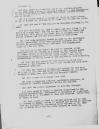
|
7.
January 27, 1922. "Report on Conditions,
Managua, Nicaragua." Captain M. M. Taylor,
Commandant, 15th Naval District, Managua, to
Chief of Naval Operations, Navy Department, p.
7.
" . . . (c) That
there be a checking up of the various resorts in
the town with a view to placing those with a bad
reputation, as the one of Chavela Cruz where the
recent trouble started, out of bounds. ¶ (d) The
maintenance of a patrol to check up these places
so as to ensure the punishment of those who
violate the order. ¶ (e) That all men of the
command be required to sleep in the post. ¶ (f)
That an effort be made to establish some place
on the order of a club where the men may go in
town for meals and liquor they will get in any
case, and to arrange with the police authorities
for the supervision of this place. ¶ (g) That
more severity should be used in the punishment
of men, especially of non-commissioned officers
than the reports of punishments would indicate,
for drunkenness. Cases of Lamb and Barth. ¶ (h)
That an effort should be made to promote better
relations with the people by opening up the
picture shows and other events to the better
class people, and by the promotion of baseball
with the local teams. Much can be accomplished
by the officers of the command in this
direction. ¶ (i) That the Commanding Officer
should be given full latitude in the transfer of
men to the States who have shown themselves
unfitted. ¶ (j) That the limit of fifteen (15)
months for the stay of a man in this com and be
strictly adhered to, and no man allowed to stay
over this time for whatever reason. ¶ (k) That a
band be assigned this post. ¶ (l) That a
competent officer, preferably chaplain, be
assigned to promote amusements within the
command. ¶ (m) That the marine personnel be
entirely changed. ¶ (n) That means be taken to
improve conditions in the marines [marines’]
surroundings, preferably by selection of a new
site, temporarily by an increase in area now
occupied. Latter will be taken in hand. ¶ (o)
That effort be made to get the marines out of
town on liberty by hikes, visits to estates and
points of interest. That the question of
furnishing motor sailers on the lake and
allowing their use for leave parties be taken
up. . . . "
|
|
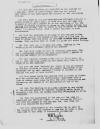
|
8.
January 27, 1922. "Report on Conditions,
Managua, Nicaragua." Captain M. M. Taylor,
Commandant, 15th Naval District, Managua, to
Chief of Naval Operations, Navy Department, p.
8.
" . . . CONCLUSIONS.
¶ (a) That the situation now occupied by the
marines is a bad one. There is insufficient room
for the proper activities of the post under the
control of the Commanding Officer. ¶ (b) That
some of the non-commissioned officers have not a
proper sense of their duty, in that they did not
keep the Commanding Officer informed as to the
existence of the bad feeling evidently existing
as shown by the fights between the marines and
police. Nor, as shown by the evidence of
Sergeant Brady, U.S. Marine Corps, show a proper
interest in such occurrences. ¶ (c) That the
practice of so many of the command living with
women outside the limits of the post is a bad
one, in that it gives them too great an interest
outside their proper duties. This applies also
to those not given all night liberty. ¶ (d) That
many men were kept too long, leading to the
building up of interests outside the command. ¶
(e) That such cases as that of Corporal
Pachinger, who ran a restaurant outside the post
while still a member of the command should not
be tolerated. ¶ (f) That general liberty after
9:00 or 10:00 p.m., is bad in that the only
place men can spend this time is with women or
in the cantinas. ¶ (g) That too much leniency
was shown in the punishment of non-commissioned
officers who showed themselves to be drunkards
and by such leniency failing to impress on the
command the evil of such conduct. (h) That cases
where the marines were involved in fights with
the police were not sufficiently considered with
a view to taking such cases up with the civil
authorities and correcting any abuses by the
punishment of one of the other. ¶ (i) That the
wearing of civilian clothes by any member of the
command should be stopped. Anything which tends
to separate a man from the purely military
atmosphere is to be condemned. ¶ (j) That the
appearance of the men and the camp is excellent
and reflects credit on the Commanding Officer;
but that the morale of the men was low, that
they did not feel themselves supported. ¶ (k)
That considerable of the trouble can be laid to
the passing on of old grudges to new men by
those a long time here so the total is
constantly increasing. ¶ M. M. TAYLOR ¶ Captain,
U S Navy."
|
|
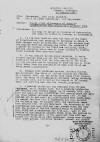
|
1.
January 28, 1922. "Events after
adjournment of Board of Investigation into
affair of 8 December 1921." Captain M. M.
Taylor, Commandant, 15th Naval District,
Managua, to Chief of Naval Operations, Navy
Department, p. 1.
" . . . AMERICAN
LEGATION ¶ Managua, Nicaragua, ¶ 28 January
1922. ¶ From: Commandant, 15th Naval District. ¶
To: Chief of Naval Operations, Navy Department.
¶ Subject: Events after adjournment of Board of
Investigation into affair of 8 December 1921. ¶
Enclosures: 2. ¶ (A) Copy of letter to Minister
of Gobernacion. ¶ (B) Reply to letter to
Minister of Gobernacion. ¶ 1. It was soon
realized from the work of the board of
investigation that securing of testimony on
which to base charges would be difficult, and it
was evident that the marines were not telling
the truth. The presence of a number of marines
at the fight was definitely shown, yet the
testimony under oath of those marines on liberty
would indicate that none were there. ¶ 2. It was
decided to try other measures, to bring charges
against some men and try them by general
court-martial in the hope that the long session
of the board and the suspense due to bringing of
some one man to trail would break down the
resolution of some individual and bring about a
confession. ¶ 3. Charges were preferred against
Privates Glasson and Devereaux. The trail of
Private Glasson was ordered on 9 January 1922,
and the trial took place 17-20 January, 1922.
The board of investigation finished taking
testimony 17 January 1922, and submitted its
report on 19 January 1922, and left the same day
for Corinto, Nicaragua. ¶ 4. A partial
confession was obtained from Private Devereaux,
on 21 January 1922, but a complete confession
was obtained from Private Keipp, on 23 January
1922. This gave the names of but twenty-four
(24) participants but gave the total number
involved as thirty-seven (37). It was decided
not to act until all participants were known,
keeping secret the fact that a confession had
been secured. The following day, 24 January
1922, the remaining names were secured from
Private Devereaux. The substance of the
confessions was that word had been passed about
the Camp that the police of the 2nd District
would be beaten up that night and a rendezvous
for 7:45 p.m., made at the Cantina of one
Comchita Donares where those who desired to
participate would meet. At the appointed time
roll was called and thirty-seven (37) responded.
These were divided into three groups, Corporals
Bennett, Russell and Amthor . . . "
|
|
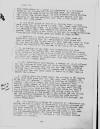
|
2.
January 28, 1922. "Events after
adjournment of Board of Investigation into
affair of 8 December 1921." Captain M. M.
Taylor, Commandant, 15th Naval District,
Managua, to Chief of Naval Operations, Navy
Department, p. 2.
" . . . each took
charge of a group and proceeded by a different
route to the Cantina of one Chavela Cruz. The
original intention had been to go to the 2nd
District Police Station and attack the police
there. It does not appear that the majority of
the men expected more than a fist fight, but
about five were armed. ¶ 5. The first squad to
arrive at Chavela Cruz’ Cantina sent three men
in to start a fight, they found some officers of
the Republican Guard in citizens clothes in the
place and assaulted them. This brought the
police who as is their custom, blew whistles and
fired in the air to bring assistance. These
police were fired upon and three of them killed.
¶ 6. Sergeant Lee Henry and Corporal Ray Frey,
were at Conchita’s Cantina when the organization
took place but took no part in the attack nor
did they take any steps to stop it. One man,
mounted, was used as a scout to watch for and
report the arrival of the police at the scene of
the fight. ¶ 7. An inkling of the fact that
information had been secured must have leaked
out, for about midnight 23 January 1922,
Sergeant Henry, who was on guard and Corporals
Russell, Bennett and Amthor deserted, taking
five automatic pistols and about 500 rounds of
ammunition. This was discovered about 1:00 a.m.,
24 January 1922. ¶ 8. The authorities were
warned, a reward of $50.00 offered for the
capture of each man and their assistance
requested. Word was soon brought that the men
had been seen marching towards Leon, 45 miles
west of Managua and a patrol of one officer and
four men sent there by train to arrest them or
assist the police. ¶ 9. Nothing more was heard
until the evening of 25 [originally written
“24,” with the “4” crossed out and “5”
handwritten above it] January 1922, when word
came they had been seen near Diriamba, 22 miles
S.W. of Managua. A patrol consisting of Captain
N. E. Landon, U.S. Marine Corps, and four men,
together with Captain Diego Romero of the
Republican Guard as guide was sent by automobile
to Diriamba. Just as they were leaving, about
10:00 p.m., word was received that there had
been a fight between the deserters and the
police early in the evening resulting in the
death of one marine and two police, and the
serious wounding of two police and less serious
wounding of five others. The other marines had
escaped. Two police later died. ¶ 10. The
following morning the Minister of
Communications, acting for the Minister of
Gobernacion (police) informed me that Captain
Landon was at Diriamba with two prisoners, who
had been captured by the police and delivered to
him, and the body of the dead marine, who had
been shot in the head and was unrecognizable.
The third marine had also been captured and was
held at Jinotepe on the railroad between
Diriamba and Managua. . . . "
|
|
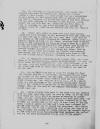
|
3.
January 28, 1922. "Events after
adjournment of Board of Investigation into
affair of 8 December 1921." Captain M. M.
Taylor, Commandant, 15th Naval District,
Managua, to Chief of Naval Operations, Navy
Department, p. 3.
" . . . 11. The
Minister of Communications also stated that
reports indicated the people much roused and
Captain Landon in some danger, and that troops
had been despatched to keep order. It was
ascertained that an engine and box car were in
Diriamba and effort was made to get word through
for the Jefe Politico at Diriamba to see Captain
Landon aboard the car with his men, prisoners
and dead body, to stop at Jinotepe for the other
prisoner and proceed to Managua, where he would
be met outside the town and brought to camp. ¶
12. Before this could be done word came that
Captain Landon had left Diriamba in his
automobile with the prisoners and left two men
to bring the dead body back. Also that he had
picked up the other prisoner at Jinotepe. About
12:30 p.m., Captain Landon arrived and the three
prisoners were confined, owing to the mutilation
of Sergenat [Sergeant] Henry’s face by a bullet
it was not known who he was until the others
were picked up. On Captain Landon’s return it
was found that all talk of trouble between
himself and the people was false. That he had
been given every assistance and treated with
courtesy throughout. The two men left at
Diriamba came down in the box car without being
molested, bringing the body with them. ¶ 13. At
breakfast formation on 24 January 1922, all
those known to be implicated were placed in
confinement, and when the other names had been
secured they were also confined. As it was known
that the whole command knew of this affair it
was not considered safe to leave their guarding
to the rest of the command. ¶ 14. The GALVESTON
was due to sail for Panama for fuel with Colonel
Charles C. Carpenter, Lieutenant-Colonel Tracy
and members of the court. She was held, Colonel
Carpenter and Lieutenant-Colonel Tracy ordered
back and the marine guard ordered up. They
arrived at 2:00 p.m., of 25 January 1922, and
the guarding of the prisoners immediately turned
over to the GALVESTON’S [GALVESTON’s] guard and
no communication allowed between them and the
rest of the regular detachment. GALVESTON sailed
same day. ¶ 15. Marine patrols were sent in the
hope that any contact with the four deserters
would be made by them, as it was felt that these
men would shoot up anyone attempting to arrest
them, and the Nicaraguans cannot shoot and have
poor arms. One American here, the Collector of
Customs, informed me he had advised the
authorities to try only to keep track of the men
until a marine patrol arrived and I have been
informed the police were ordered not to injure
the deserters, this cannot be verified. But it
was a surprise that after the loss of so many of
their own people the three marines who escaped
capture on the 25th were in no way molested when
captured the following day and were immediately
turned over to the patrol. . . . "
|
|
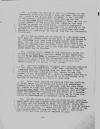
|
4.
January 28, 1922. "Events after
adjournment of Board of Investigation into
affair of 8 December 1921." Captain M. M.
Taylor, Commandant, 15th Naval District,
Managua, to Chief of Naval Operations, Navy
Department, p. 4.
" . . . 16. A letter
was written by the U.S. Minister, to the
Nicaraguan Government thanking them for their
assistance and a similar one by me, (copy
attached) to the Minister of Gobernacion. The
effect of these letters and the immediate steps
taken for the capture of these men has had a
good effect. It was rumored that these men had
been allowed to escape to avoid trial. A Liberal
newspaper “La Noticia” came out this morning
with an article on the subject to the effect
that the U.S. Authorities were more energetic in
protecting the people than was the Nicaraguan
Government. ¶ 17. It was an error not to confine
the men whose names were know [known] as
participants on the 23rd, I was influenced by
the knowledge that many more equally guilty were
in the Camp, and the fear that some of these
would compose the guard and release those
confined. None of the men could be wholly
trusted, though during the time they composed
the guard there was no trouble. ¶ 18. Captain
Diego Romero of the Republican Guard was of
great assistance to Captain Landon on his
expedition and it is my intention to express my
appreciation to the Government. It is hoped the
Department will see its way clear to express to
the Government of Nicaragua, its appreciation of
the action of the police. ¶ 19. Privates
Devereaux and Keipp were promised immunity if
they would confess fully. After their confession
they expressed fear at remaining here and were
sent to the GALVESTON for safe keeping and will
return in her from Panama. It was considered
they could be secured from bodily harm, but it
was feared they might be so influenced as to
decline to testify on the trial if kept here[.]
¶ 20. There areat [are at] present thirty-five
(35) men confined. Of these three will be tried
for murder and scandalous conduct for the affair
of 8 December 1921; the same three are liable to
trial for murder and desertion for the affair of
25 January 1922. The remaining thirty-two (32)
will be tried for scandalous counduct [conduct]
for the affair of 8 December, 1921, and it may
be that certain of them may be tried for murder
or manslaughter if evidence can be produced. ¶
21. The thirty-five (35) men now confined all
testified under oath they had nothing to do with
the affair of 8 December 1921, and are liable to
trial for perjury. Others who testified they
knew nothing of this affair may also be subject
to trial for perjury. It seems certain that a
number of the non-commissioned officers who took
no part in this affair knew of it and were
guilty of neglect of duty. . . . "
|
|
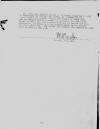
|
5.
January 28, 1922. "Events after
adjournment of Board of Investigation into
affair of 8 December 1921." Captain M. M.
Taylor, Commandant, 15th Naval District,
Managua, to Chief of Naval Operations, Navy
Department, p. 5.
" . . . 22. With the
limited number of officers available it will be
impossible to try all the above, as Article 139,
(b), Naval Courts and Boards, limits the number
of cases that can be brought before a court. By
trying in joinder it is hoped to cover the more
serious offenses of murder (or manslaughter),
desertion and for participation in the affair of
8 December 1921. The trials for perjury and
neglect of duty will be held in abeyance. ¶ M.
M. TAYLOR. ¶ Captain, U.S. Navy."
|
|
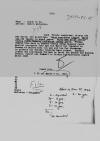
|
March 6, 1922.
Report on Trials. Captain M. M. Taylor,
Commandant, 15th Naval District, Managua, to
Chief of Naval Operations, Navy Department.
"1219 ¶ From: Comdt 15th. ¶ Action: Opnav,
Marcorps. ¶ 1006 Trials completed, thirty two
men tried, six acquitted. Three sentenced
twelve, three ten and twenty to eight years.
Three men tried affair twenty fifth January
sentenced twenty years. Transferred this date to
Denver twenty seven General Court Martial
prisoners four men for Haiti for transfer to
Nereus at Balboa also ten men and two for
discharge to subbase for further transfer Mare
Island. Captain Landon and Lieutenant Fellows to
Haiti Via [via] Denver and Nereus. Amthor,
Bennet [Bennett] and Russell to Boston via
Galveston eighth March 1000 ¶ Comdt 15th. ¶ 2 16
pm March 6th, 1922. ¶ S ¶ 19 ¶ 00 ¶ 01 ¶ 11 ¶ 12
¶ 38 ¶ Bunav ¶ Marcorps – Original. ¶
[handwritten on paper: “Affair of Jan. 25, 1922”
¶ “6 – acquitted” ¶ “20 – 8 yrs.” ¶ “3 – 10
yrs.” ¶ “ 3 – 12 yrs.” ¶ “3 – 20 yrs.” ¶ “32/26
convicted”]"
|
|
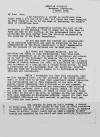
|
March 7, 1922.
Letter from Unknown, American Legation, Managua,
to "My dear Cole," p. 1.
"AMERICAN LEGATION ¶
Managua, Nicaragua, ¶ 7 March 1922. ¶ My dear
Cole: ¶ I am enclosing a letter on conditions
here which seem a bit out of my line, but which
has been inspired by what seems to me to be the
need of informing the Department of conditions
here. ¶ The Navy Department carries the cost of
the retention of the Marines, both in money and
in the loss of some 120 men to the service. On
the detachment falls the criticism and they
suffer from the ill-will engendered by the
policies of the State Department. ¶ As you may
know the Customs are administered by an American
appointed and paid by Nicaragua on the
recommendation of the State Department. A High
Commissonier [Commissioner] and the Manager of
the Railroad are in like position. ¶ All these
get handsome salaries, and in addition are three
or four subordinates, also well paid. The Bank
management is in the hands of Englishmen and
aliens; as is that of the Ultramar. In Managua
the No. 1 and 2 men of both Bank and Ultramar
are English, in Matagalpa, a single German is
branch manager for both, in Bluefields the
branches are in charge of a Mexican and a German
respectively, in Leon a Nicaraguan and an
Englishman hold the positions. Reports from the
bank are therefore liable to be influenced by
self-interest and nationality. ¶ While I
recognize the fact that policies, such as that
employed here, are the province of the State
Department, it does seem to me that that
Department should recognize our difficulties and
by full publicity of the acts of its agents
render innocuous such criticism as is now
rampant. An investigation by disinterested men
conversant with business and banking methods,
with a full report, would, it seem to me,
clarify the atmosphere. At least it would show
why there has been, as far as I am told, no
advance in the ten years we have been dabbling
in Nicaraguan affairs, beyond the fact that
Government officials are more assured in getting
their pay, and there has been peace. ¶ The
country is poor as Job’s turkey. A number of
travelling men I have spoken to say that in
other countries of Central America they can
collect on their debts, in Managua there is
nothing doing. Every now an [and] then a number
of poor devils are arrested in the night and
made soldiers, “recruiting” . . . "
|
|
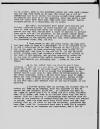
|
March 7, 1922.
Letter from Unknown, American Legation, Managua,
to "My dear Cole," p. 2.
" . . . it is
called, sent to the Honduran border and come
back clamoring for pay when there is no pay. The
other day a lot of ammunition had to be moved;
the police seized every bull-cart in Managua and
sent it to the magazine. They had about a
hundred and could have used less than half that
number. Result transportation at a standstill
for 24 hours. ¶ The whole arrangement here seems
half-hearted and without definite system. If
these bankers and customs men want to take
employment under the Nicaraguan Government, I
cannot see why they should have a guard of
marines to protect them while drawing fat
salaries. If the United States wants to really
improve conditions here, let it really use the
power the presence of the marines give and tell
these mountebanks in government where they get
off. ¶ I hope never to see the place again. My
stay here has been more or less of a nightmare.
It is no pleasant sight to see a detachment of
so fine a service as the U.S.M.C. so far in the
muck. To know absolutely they were guilty of an
atrocious act, and have to dig and dig to get
any definite proof, butting your head against a
stone wall of silence on the part of the
marines, and getting hopelessly entangled in the
mass of conflictive native testimony. It has
been most disagreeable and extremely sad, I
dream of the damn thing. ¶ As to the letter that
has brought about this effusion do with it what
you will. It does not seem to be quite the thing
for an official report, it can only be taken as
a showing of what might be called the
atmosphere, a definite report could only be made
after an investigation into the whole business,
which I am far from being able to make. There
are more pressing troubles on my hands. Having
gotten it off my chest I leave to you its future
destination, and do not over much care whether
this be the waste-basket or the archives. ¶ I
flatter myself that on leaving the marines will
be better off than on my arrival. Told the
Minister of War we wanted our own athletic field
etc., so extended our part of the Campo de Marte
from 5 to 12 acres out of a total enclosed area
of 18 acres, and took in an orchard where they
can run a garden. Told the Minister of
Gobernacion that marines were entitled to the
benefits of exterritoriality and hence not
subject to arrest; that his cops would keep
their hands off and stop beating them up, we
would do our own arresting. Carpenter has been
fine, gets the Government band once a week for a
concert and fills them up on lemonade and
sandwiches; has a lot of […] "
|
|
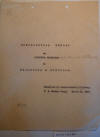
|
1.
March 24, 1922.
"Confidential Report on Political Conditions in
Nicaragua & Honduras," Lt. Col. J. K. Tracy,
U.S.M.C., p. 1.
"CONFIDENTIAL REPORT
¶ on ¶ POLITICAL CONDITIONS ¶ in ¶ NICARAGUA &
HONDURAS. ¶ Submitted by Lieut-Colonel J.K.
Tracy, ¶ U. S. Marine Corps. March 24, 1922."
|
|
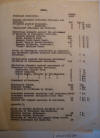
|
2.
March 24, 1922.
"Confidential Report on Political Conditions in
Nicaragua & Honduras," Lt. Col. J. K. Tracy,
U.S.M.C., p. 2.
"INDEX. ¶ PAGES. ¶
Political conditions. ¶ 1-12 ¶ General political
situation Nicaragua and Honduras. ¶ 1-2 ¶ Par.
2. ¶ Political parties Nicaragua. ¶ 2 ¶ “ 3.
a,b. ¶ “ “ Honduras. ¶ 2 ¶ “ 4. a,b. ¶
“Emigrados” Nicaragua and Honduras. ¶ 2 ¶ “ 5. ¶
Disturbing elements against the government of
Honduras in Nicaraguan territory. ¶ General
Ernesto Alvardo. ¶ 2-3 ¶ “ 6. a. ¶ Ramon
Turchio’s Band. ¶ 3-4 ¶ “ 6. b. ¶ General Felix
Pedro Pinal. ¶ 5. ¶ “ 6. c. ¶ Solis’ Band of
Revolutionists. ¶ 5-6 ¶ “ 6. d. ¶ General
Jefferies, (American). ¶ 6 ¶ “ 6. e. ¶ “Chico”
Martines Fumes. ¶ 6 ¶ “ 6. f. ¶ Action of
Nicaraguan authorities in suppressing movements
against Honduras from Nicaraguan territory. ¶ 6
¶ “ 7. ¶ Disturbances against Nicaraguan
government initiated in Honduranean [Honduran]
territory. ¶ 7-8 ¶ “ 8. ¶ Disturbing elements
against government of Nicaragua in Honduranean
[Honduran] territory. ¶ Conception Peralta Cruz.
¶ 8 ¶ “ 8. ¶ Nicaor Espinosa. ¶ 8 ¶ “ 9. ¶
Carlos Lagos, Minister of War, Honduras. ¶ 8 ¶ “
9. ¶ “ “ “ “ “ “ ¶ 9 ¶ “ 10. ¶ “ “ “ “ “ “ ¶ 9 ¶
“ 11. ¶ President of Honduras. ¶ 9 ¶ “ 11. ¶
Nicaraguan Troops. ¶ 9-10 ¶ “ 13. ¶ Honduras
Troops. ¶ 10 ¶ “ 14. ¶ Treatment of civilians by
troops. ¶ 10 ¶ “ 15. ¶ Treatment accorded
Americans both countries. ¶ 10-11 ¶ “ 16. ¶
Treatment accorded foreigners other than
Americans. ¶ 11 ¶ “ 16. a. ¶ Reasons for respect
accorded to Americans. ¶ 11. ¶ “ 16. b. ¶
Appendix 1. ¶ Notes on certain Military features
of the Republics of Nicaragua and Honduras. ¶
Military Forces, Nicaragua. ¶ 13 ¶ “ 1. ¶
Military Forces, Honduras. ¶ 13-14 ¶ “ 2. ¶
Character of terrain and people along border
between Nicaragua and Honduras. ¶ 14 ... "
|
|
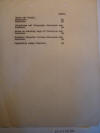
|
3.
March 24, 1922.
"Confidential Report on Political Conditions in
Nicaragua & Honduras," Lt. Col. J. K. Tracy,
U.S.M.C., p. 3.
" . . . Pages. ¶
Roads and Trails. ¶ Nicaragua. ¶ 14 ¶ Honduras.
¶ 14 ¶ Telephones and Telegraph, Nicaragua and
Honduras. ¶ 15 ¶ Notes on existing maps of
Nicaragua and Honduras. ¶ 16 ¶ Boundary disputes
between Nicaragua and Honduras. ¶ 16 ¶
Population along Frontier. ¶ 16. . . . "
|
|
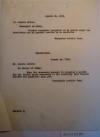
|
4.
March 24, 1922.
"Confidential Report on Political Conditions in
Nicaragua & Honduras," Lt. Col. J. K. Tracy,
U.S.M.C., p. 4.
" . . . Agosto 26,
1921. ¶ Sr. Leaube Alfaro. ¶ Encargado en Limay.
¶ Sirvase organizar resquardo en la grecia segun
las facultades que el general Peralta le ha
conferido. ¶ Concepcion Peralta Cruz. ¶
TRANSLATION. ¶ August 26, 1921. ¶ Mr. Lionte
Alfaro: ¶ In charge of Limay. ¶ Take the
necessary measure to organize a patrol for the
Grecia mines according to the authority that
General Peralta has conferred upon you. ¶
Concepcion Peralta Cruz. ¶ Exhibit I. . . . "
|
|
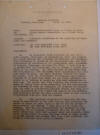
|
5.
March 24, 1922.
"Confidential Report on Political Conditions in
Nicaragua & Honduras," Lt. Col. J. K. Tracy,
U.S.M.C., p. 5.
" . . . CONFIDENTIAL
¶ American Legation, ¶ Managua, Nicaragua. ¶
March 24, 1922. ¶ From: Lieutenant-Colonel James
K. Tracy, U.S.M.C. ¶ To: Major-General
Commandant, U.S. Marine Corps, Washington, D.C.
¶ Subject: Political conditions in the Republics
of Nicaragua and Honduras. ¶ Reference: (a) Your
8606-1330 (Dec. 1921) ¶ (b) Your 8607-1602 (Feb.
1922) ¶ Enclosures: ¶ 1. In accordance with
reference (a) and (b) I left Managua, Nicaragua,
on February 14, 1922, and covered the border
between the Republics of Nicaragua and Honduras,
from Chinandega to Ocotal on the Nicaraguan
side, and from Tegucigalpa to Choluteca on the
Honduranean [Honduran] side, returning to
Managua, Nicaragua, on March 17, 1922. I took
with me as interpreter and translator, Mr. F.
Walker, a former corporal of the marines. The
trip was made on mule-back with the exception of
a few stretches where automobiles and railroad
could be used. The total distance covered was
about 400 miles. Both the Governments of
Nicaragua and Honduras assisted me as best they
could and the local officials appeared to be
willing to supply me with such information as
they had. The people were very friendly and
showed no hesitancy in airing their views
concerning the two Governments. The tendency of
both the officials and citizens to exaggerate,
and even to deliberately falsify events, has
been carefully discounted in this report and
almost all the information contained herein was
only accepted after it had received verification
from more than one source. ¶ 2. The political
situation of Nicaragua and Honduras is
complicated by the fact that in both countries
the people at large are more loyal to one of the
two parties – conservatives and liberal[s] –
than they are to their own country. That is, the
conservatives and liberals of both countries are
so strongly affiliated that for the sake of
their party they would turn against their own
country. Within these parties there are many
factions which at times become so bitter against
one another that they would sacrifice anything
to overcome their party opponents. . . . "
|
|
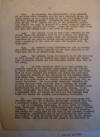
|
6.
March 24, 1922.
"Confidential Report on Political Conditions in
Nicaragua & Honduras," Lt. Col. J. K. Tracy,
U.S.M.C., p. 6.
" . . . 3.a. In
Nicaragua the Conservative Party consists of the
rich white element, and the most ignorant class,
in other words, it is a party made up of the
very highest and the very lowest elements.
Nepotism in this party is carried to the “n”th
degree and all of the important political
offices are held by members of a small group of
families from Managua, Granada and Rivas. Along
the border this party has only one strong hold –
the town of Ocotal. ¶ 3.b. The Liberal Party in
Nicaragua consists of the middle class and
includes most of the lawyers and doctors. This
party is extremely strong along the frontier
with the exception of the town of Ocotal already
mentioned, and has also a majority in the town
of Leon, the largest city in Nicaragua. ¶ 4.a.
In Honduras party divisions are not so marked.
The Conservative Party consists of the same
elements as in Nicaragua but it is numerically
small. ¶ 4.b. The Liberal Party of Honduras is
in the majority in that country but is divided
into many groups who follow some particular
leader and his dictates rather than that of the
party. ¶ 5. In both countries there is a very
strong opposition party to the present
Governments and the leaders of these movements
gather together small bands on the frontier of
their country and receive the moral and
sometimes the physical support of the officials
of the country other than their own. These
revolutionists are called “emigrados” and as
this term cannot be readily translated, they
will so termed hereafter. The expression
“emigrado” includes all persons who have been
expelled from a country for having created
political disturbances and in addition includes
many individuals who have been guilty of civil
crimes. It is these “emigrados” that keep both
Nicaragua and Honduras in a continual state of
unrest and they are the nucleus from which are
formed the serious revolutionary movements. ¶ 6.
Starting from the south on the Nicaraguan side
the following are the principal disturbing
elements that are a continual menace to the
present Honduranean [Honduran] Government. ¶ (a)
At Campusano, Nicaragua, 20 miles north of
Chinandega, Nicaragua, there is a Honduranean
[Honduran] named General Ernesto Alvarado. This
man is from the northern coast of Honduras and
during the early part of the term of the present
President of Honduras, controlled one of the
districts on that coast and grafted to such an
extent that he was put out of government office.
The proceeds of his graft he has invested in . .
. "
|
|
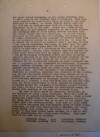
|
7.
March 24, 1922.
"Confidential Report on Political Conditions in
Nicaragua & Honduras," Lt. Col. J. K. Tracy,
U.S.M.C., p. 7.
" . . . the place
called Campusano, an old Zelaya property, some
20 miles east of the frontier line of Honduras.
This property consists of about 90,000 acres on
which he has some 3000 head of cattle. He speaks
English fairly well and has with him an American
woman from New Orleans whom he introduced to me
as his wife. During his regime on the north
coast in governmental capacity, he was a hard
drinker and extremely fond of dress having
ordered uniforms from the United States that
cost $3,000.00. He is now working very hard on
his ranch and not drinking, and claims he is no
longer interested in the politics of Honduras
which fact he was extremely anxious to impress
upon me. He asked me to inform the President of
Honduras when I saw him, of what I had seen of
Campusano, Nicaragua, in order that the
Honduranean [Honduran] authorities might know
his status. He does not appear to have much of a
following in the part of Honduras through which
I passed, this, however, does not include the
north coast from which part he comes. While at
his house I saw 10 Nicaraguan Government rifles
and upon inquiring Alvarado admitted to me that
these had been supplied to him during February
of this year, by the “jefe politico” (an
official who is practically governor in each
department and who is appointed by the
President) of Chinandega, Nicaragua, named
Perfecto Tijerino, for the purpose of protection
against any marauding bands who might appear
from Honduras to molest him. This man Tijerino,
I was informed by the officials in Honduras,
including the President of the country, was the
one Nicaraguan official whom they considered to
be giving the greatest assistance to those who
were preparing revolutionary movements in
Nicaragua against Honduras. Alvarado is, I
believe, a very ambitious man and one who would
seek the first opportunity to force himself on
Honduras as President should the slightest
opportunity present itself. His wife, who is a
very forceful and intelligent woman, admitted
this ambition on the part of Alvarado to me. ¶
(b) Some 50 miles north of Campusano, Nicaragua,
in the district of Cinco Pinos, Nicaragua, there
is a band of some 20 or 30 alleged Honduranean
[Honduran] “emigrados”. Their methods during the
raids which they make on Honduranean [Honduran]
territory are such, that I believe them to be
more of the bandit type rather than real
revolutionists. This band is fully armed with
rifles and makes its headquarters north of Cinco
Pinos, Nicaragua, in some very unaccessable
[inaccessible] mountains, the places being
called Plan Grande and the Caves of El Falcon.
The leader of this band called Ramon Turchio, is
a man of very little intelligence and a very
heavy drinker. Other members of the band are as
follows: ¶ Gilberto Zelaya from Choluteca,
Honduras ¶ Fernando Abendino from Choluteca,
Honduras . . . "
|
|
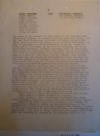
|
8.
March 24, 1922.
"Confidential Report on Political Conditions in
Nicaragua & Honduras," Lt. Col. J. K. Tracy,
U.S.M.C., p. 8.
" . . . Julio
Abendino from Choluteca, Honduras ¶ Pedro Flores
“ San Marcos, Honduras ¶ Rafael Vasquez “ San
Marcos, Honduras ¶ Pablo Ramos ¶ Juan Matamoras
¶ Octavio Vargas ¶ Carmito Solgardo ¶ Ernesto
Duarte ¶ Juan Valladares ¶ Pedro Carranjo ¶ The
names of the members of this band and the
location from which they operate, are common
property along the border, and the fact that
Nicaraguan Government officials in that district
have not long ago broken up or captured this
band, can only be explained by an unwillingness
to do so. While at Cinco Pinos, Nicaragua, on
the 17th of February, the local Nicaraguan
commander, Colonel Buenvente, with 35 armed
soldiers, made an excursion after this band; but
as he returned with only one Honduranean
[Honduran], a Dr. Benitis, who was released as
soon as I left the district, I do not believe
that Colonel Buenvente had the slightest
intention or desire to interfere with the
operation of Turchio’s band. The following are
the raids which this band of Turchio, operating
from Nicaraguan territory, has made on
Honduranean [Honduran] towns and places: ¶ (B.1)
January 29, 1922, they raided the store of the
German, Siercke, at the American mine at
Cacamuyá, Honduras, and stole material from this
store valued at $100.00. In this raid Nicaraguan
Government forces actually assisted and took
part. These forces consisted of 14 soldiers led
by Colonel Cajina. This action on the part of
Cajina was repudiated by the Nicaraguan
Government and he is now out of the service and
at large, his present whereabouts I have been
unable to ascertain. The fact that Cajina and
Nicaraguan Government soldiers actually took
part in this raid, is evidenced by a telegram
which one of the Nicaraguan army generals sent
to the Honduranean [Honduran] officials stating
that Cajina’s actions were a disgrace to the
Nicaraguan arms. ¶ (B.2) February 4th – San
Antonio de Flores was raided. ¶ (B.3) February
10th – Triunfo was raided. ¶ (B.4) February 28th
– Jayacayan was raided and among other articles,
clothing, food, money and animals were stolen. ¶
(B.5) March 11th – Cacamuyá, Honduras, was
raided. No considerable amount of money was
obtained however, as the bandits were driven
away from the store of the German, Siercke, by
the superintendent of the Cacamuyá mines, an
American named Samuelson. This band is still
operating and making raids whenever and wherever
it pleases in the district referred to. . . . "
|
|
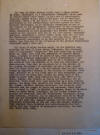
|
9.
March 24, 1922.
"Confidential Report on Political Conditions in
Nicaragua & Honduras," Lt. Col. J. K. Tracy,
U.S.M.C., p. 9.
" . . . (c) Some 10
miles farther north, near a place called El
Rhine, Nicaragua, is a Honduranean [Honduran]
“emigrado” whose name is General Felix Pedro
Pinal. He is a man of considerable property,
almost white, very intelligent and of excellent
character. While I do not think he is at present
an active participant in the revolutionary
movement against the Honduranean [Honduran]
Government, he is evidently recognized as one of
the biggest of the Honduranean [Honduran]
“emigrados” on the Nicaraguan frontier. He
admitted to me he was in correspondence with
Solis (described in next paragraph) and further
showed me a report he had received from one of
the Honduranean [Honduran] “emigrado” generals,
concerning a recent battle which they had had
with the Honduranean [Honduran] Government
forces. This man Pinal, made a very favorable
impression on me and appeared to be of a much
higher type than any of the officials of the
present Honduranean [Honduran] Government whom I
have met. ¶ (d) About 25 miles farther north, in
the district surrounding the town of Santa
Maria, Nicaragua, the strongest band of
Honduranean [Honduran] “emigrados” had been
operating up until March 10, 1922. This band was
commanded by General Rufino Solis, a lawyer of
about 30 years of age, very intelligent but
lacking military experience. From a conversation
I had with this man, I was convinced that he is
a visionary man who believes that his mission is
to free his countrymen, the Honduraneans
[Hondurans], from what he considers to be the
misrule of the present Government of Honduras.
He has a fine, honest face but lacks force and I
do not believe that he will ever become an
important element in the affairs of Honduras.
This band, referred to in the first part of this
paragraph, consist of about 80 armed men. During
the early part of the month of March 1922, they
raided at will, the towns of Paraiso, Duyure,
San Antonio de Flores and Morolica, all in
Honduras. These raids have been conducted in a
very orderly manner, the money they received was
taken from the stores of the German, Siercke,
already mentioned, and receipts given therefor
and the people at large not molested. About 3:00
p.m. of March 9, 1922, at Diraqui, Honduras,
which is 10 miles south of Santa Maria,
Nicaragua, on the border between Nicaragua and
Honduras, some 150 Honduranean [Honduran]
Government troops from Yuscaran, Honduras, had
an engagement with 28 of Solis’ band and the
Government troops were defeated. At about 5:00
p.m. of the same day, General Mendosa arrived
with reinforcements consisting of 200 men from
San Marcos, Honduras. This combined force
defeated the revolutionists who were driven over
the frontier to Nicaraguan territory. The next
day, March 10th, 1922, . . . "
|
|
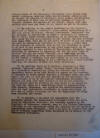
|
10.
March 24, 1922.
"Confidential Report on Political Conditions in
Nicaragua & Honduras," Lt. Col. J. K. Tracy,
U.S.M.C., p. 10.
" . . . Reyes of the
Nicaraguan Government armed forces from
Ocotal[,] Nicaragua, captured Solis and 14
others. Solis is now in Managua the capitol of
Nicaragua, under police surveillance. The
remainder of this band is now under command of
Felix B. Vasquez. Whether the capture of the
leader, Solis, will discourage this band and
break it up, cannot as yet be foretold. ¶ (e) In
addition to the people mentioned on the
frontier, there are in Managua, Nicaragua, under
police surveillance of a not very strict
character, several Honduranean [Honduran]
“emigrados” who are awaiting an opportunity to
start a revolution in Honduras. One of these,
named General Jefferies, is an American citizen
well known for his participation in all Central
American revolutions since 1896. This man is now
about 60 years of age and while his name is
continually mentioned in Nicaragua, I could find
little evidence in Honduras that he had any
following to speak of or that he was considered
of any great importance. He is reliably reported
to have stated in Tegucigalpa, Honduras, that –
referring to Americans in general, - all the men
were “sons of bitches” and all the women
“whores”, at a time when he was having some
difficulty over certain legal procedures in the
United States. I consider this man’s power to be
very limited. He appears to me personally to be
a blow-hard and a very undesirable type of
American citizen for these countries. ¶ (f) In
addition there is in Managua, Nicaragua, a
Honduranean [Honduran] “emigrado” named “Chico”
Martines Fumes. His name is a by-word in
Honduras and along the frontier and it was
repeatedly stated to me that should he appear on
the boundary of Honduras he could gather
together a thousand armed men over night. The
fear of this man was denoted by the continual
reports brought to me by the highest Honduranean
[Honduran] Government officials and that they
were certain he was on the frontier. These
reports were as official as they could be in
character but were all false as I ascertained
later by communicating with Managua, Nicaragua,
and typifies the unreliableness of even the best
information obtainable in these countries. He is
a man of little education but has the appearance
of being very forceful and honest. ¶ 7. In
general, I am under the impression that the
movements against the Honduranean [Honduran]
Government which are initiated on Nicaraguan
territory, are honestly opposed by the President
of Nicaragua. However, many of the highest
Nicaraguan officials in the departments along
the frontier are so inactive in suppressing
these movements, that I am lead to believe that
they may be actually supporting these movements
as is alleged by the Honduranean [Honduran]
Government. . . . "
|
|
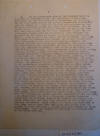
|
11.
March 24, 1922.
"Confidential Report on Political Conditions in
Nicaragua & Honduras," Lt. Col. J. K. Tracy,
U.S.M.C., p. 11.
" . . . 8. On the
Honduranean [Honduran] side of the frontier
there is at present no activity against the
Government of Nicaragua. The people are too much
occupied in fermenting and preparing for the
revolution against the present Honduranean
[Honduran] Government. Some six months ago a
very serious raid was organized on Honduranean
[Honduran] territory against the Nicaraguan
Government; that it gained any real force and
became serious, was due to the fact that many
Nicaraguans who were not “emigrados” joined the
revolutionary forces after it had started. This
movement was organized in the middle of August
1921, at San Marcos, Honduras, a town located a
few miles from the frontier. For eight days
before the movement had started, the leaders
openly made all preparations in the town of San
Macros, Honduras, and gathered together what
Nicaraguan “emigrados” they could find. The
local Honduranean [Honduran] authorities not
only did nothing to prevent this movement but
actually went so far as to openly assist in its
organization. The Commandante of Arms at San
Marcos, Honduras, Colonel Carmilo Carcarmo, who
is still in office, actually threatened
Francisco Mendosa, a Nicaraguan employee in the
store of a foreign firm at San Marcos, Honduras,
to make trouble for him if he did not join in
the movement. The manager of this firm went to
Choluteca, Honduras, and reported the matter.
The action of Colonel Carmilo Carcarmo was
repudiated by the Honduranean [Honduran]
Government officials, but no other action was
taken against this man. The leader of the band
which was being organized at San Marcos,
Honduras, was named Teofilo Jimenez, a
Guatemalan; he is now in San Salvador. About
August 21st, 1921, this band went to San Juan de
Limay, Nicaragua, and there gathered together
some 150 discontented local Nicaraguans. They
proceeded to La Grecia mine, some three miles to
the east of Limay, and there disarmed the
Nicaraguan Government forces and demanded and
obtained from the store of a man named
Castellano, several hundred dollars. They
returned a few days later and obtained more
money. These revolutionists did not, however,
molest the personnel or the property of the
Grecia mine. This band was increased in size by
the joining of many Nicaraguans, and marched
north to Somoto Grande, Nicaragua, where they
were defeated by Colonel Alvarez, commandant of
the district, a big black negro from Rivas,
Nicaragua, sometime later, and driven over the
frontier, back to the town of San Marcos,
Honduras, where they were very well received and
fed by the Honduranean [Honduran] Government.
Their rifles were taken away from them at this
time, but as these same arms later disappeared
from San Marcos, it seems only fair to assume
they were returned to these Nicaraguans. Among
the members of this band that participated in
the affair near the . . . "
|
|
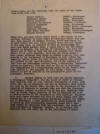
|
12.
March 24, 1922.
"Confidential Report on Political Conditions in
Nicaragua & Honduras," Lt. Col. J. K. Tracy,
U.S.M.C., p. 12.
" . . . Grecia mine,
are the following with the names of the towns
from which they come: ¶ Lazaro Guevara [from]
Esteli, Nicaragua. ¶ Alejandro Torres [from]
Leon, Nicaragua. ¶ Rafael Sandobal [from] Limay,
Nicaragua. ¶ Francisco Montenegro [from]
Managua, Nicaragua. ¶ Antonio Maldonado [from]
Limay, Nicaragua. ¶ Julio Bugamo. [from] Pueblo
Nuevo, Nicaragua. ¶ Augustin Galifano [from]
Limay, Nicaragua. ¶ Jose Maria Barantes [from]
Somoto Grande, Nicaragua. ¶ Eduardo Herrera
[from] Triapo, Nicaragua. ¶ These men, and many
other whose names I was unable to ascertain,
returned to their homes in Nicaragua where they
now are. Upon inquiry of Colonel Alvarez, above
mentioned, as to what action had been taken
against these men and others of the same type,
he informed me that no proceedings had ever been
taken against them. I asked him if the
Government located in Managua, the capital of
Nicaragua, had been informed and he told me they
had and all details were understood. It is quite
possible, that the men whose names I have given,
although they acted as common bandits, were
considered by the Government of Nicaragua to
come within the immunity, which, after the date
of this Grecia mine affair was granted to all
revolutionists. One of the members of this band
was Concepcion Peralta Cruz, a Nicaraguan
“emigrado” living in Honduras. This man went so
far as to authorize the organization of a
revolutionary guard at the Grecia mine (see
exhibit 1, the original of this order.) This man
Peralta is now an officer in the president’s
guard at Tegucigalpa, Honduras. ¶ 9. Another
member of this band was Nicaor Espinosa, a
Nicaraguan “emigrado”, who was chief of staff of
Jimenez. This Espinosa told to very reliable
informants of mine, both white men, one in
Nicaragua and one in Honduras, that before the
raid on the Grecia mine, he went to the
President of the Republic of Honduras to request
help and that the President of Honduras refused
to assist him in any way. Espinosa then went to
Carlos Lagos, Minister of War of Honduras and
also a brother-in-law of the President of that
Republic. Espinosa said that Lagos informed him
that he would supply arms and assist him in his
revolutionary movements against the Republic of
Nicaragua. I have endeavored in every possible
way to check up this information regarding Lagos
but I have been unable to establish with any
certainty, the truth of this statement of
Espinosa. However, it is certain that Espinosa
was, and still is, in the confidence of Lagos. .
. . "
|
|
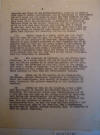
|
13.
March 24, 1922.
"Confidential Report on Political Conditions in
Nicaragua & Honduras," Lt. Col. J. K. Tracy,
U.S.M.C., p. 13.
" . . . Espinosa now
lives in San Marcos, Honduras, where he is under
a mild sort of police surveillance, and is
constantly in communication with Lagos and has
acted as agent for this minister of war in the
matter of distributing buttons with the picture
of Lagos upon them, about the countryside. I
endeavored to interview Espinosa while in San
Marcos, Honduras, but was unable to do so as he
left town immediately upon hearing that I wanted
to see him. This was the only individual with
whom I was unable to obtain an interview upon
request and is in itself an [a?] proof that
Espinosa had something serious to conceal. ¶ 10.
Carlos Lagos is a short, white man with light
hair of about 50 years of age. His sister, Dona
Anita, is the wife of the President of Honduras.
Unquestionably Lagos desires to make himself
president of that Republic and it is believed
that he will use the armed forces at his command
in order to overcome the law which prohibits a
minister of the President’s cabinet from being a
candidate for that office. Lagos is universally
hated along the border of Honduras and it is
against him, and the fear that he may become
President, that the revolution is directed. ¶
11. The President of Honduras, Sr. don Rafael
Lopez Gutierrez, is a rather simple old man of
about 60 years of age, and who is reputed to be
under the control of his wife, Dona Anita. The
President is very well liked by the people with
whom I talked in Honduras. Were he to remove
from office his Minister of War, Carlos Lagos,
the Republic of Honduras would probably be free
from all revolutionary trouble. ¶ 12. There are
in the service of the Honduranean [Honduran]
Government, several Nicaraguan “emigrados” of
considerable force and intelligence, most
notably is Horacio Aquirre of Leon, Nicaragua,
the private secretary to the President of
Honduras. ¶ 13. During my trip on the frontier,
I had a very good opportunity to observe the
military forces of both countries. The
Nicaraguan forces were undisciplined and of a
very low type and many of the rifles carried by
these men were broken and unserviceable. The
officers appeared to exercise little or no
control. No one, neither officers nor men, made
any pretense of wearing a uniform or even a
distinguishing mark, in fact the only military
uniform I saw on the Nicaraguan side of the
frontier, was a Honduranean [Honduran] uniform
worn by General Ernesto Alvarado, when he
escorted me from his place, Campusano, . . . "
|
|
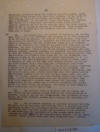
|
14.
March 24, 1922.
"Confidential Report on Political Conditions in
Nicaragua & Honduras," Lt. Col. J. K. Tracy,
U.S.M.C., p. 14.
" . . . Nicaragua.
Desertion among the soldiers was very common,
these deserters often taking with them their
rifles. On the night of February 16, 1922, at
Somotillo, Nicaragua, in a force of 50 men, 5
deserted. At San Juan de Limay, Nicaragua, the
commanding officer of a Nicaraguan Government
force named Colonel Alvarez, informed me that in
10 days his force had been reduced from 35 men
to 16 men on account of desertion. These
desertions were due to the fact that the
soldiers were not paid or were only paid in
part. ¶ 14. In Tegucigalpa, the capital of
Honduras, the government forces were well
uniformed and appeared to be well organized as
is the case in Managua, the capital of
Nicaragua. Away from the capital of Honduras,
the soldiers and officers were as bad as those
of Nicaragua, the only difference being that in
Honduras most of the soldiers were paid and at
least wore some part of the uniform. The lack of
discipline, however, was more noticeable than in
Nicaragua. While I was in San Marcos, Honduras,
the commanding general, General Mendosa, was
insulted and even threatened by both his
officers and men, but no action was taken
against them. The soldiers and officers were
drunk all day and night, and promiscuous firing
in the streets was almost continuous. I am led
to believe that this condition is probably worse
in other parts of Honduras in view of the fact
that General Mendosa was by far the best officer
that I saw among the Honduranean [Honduran]
Government troops. On March 10th, 1922, while I
was in San Marcos, Honduras, a report came in
that the town was about to be attacked. The
streets were filled with soldiers running in
every direction, with and without arms, some
seeking cover and some few others, notably the
Texiguat indians [Indians] from the town of that
name, under the command of Colonel Sanchez, who
took station behind some rock parapets. I know
that 14 soldiers deserted the town at this time
with their arms and I believe many others did
likewise. That night, bursts of fire broke out
on several occasions and single shots were fired
every few minutes. The enemy at this time, it
later developed, was 20 miles away. ¶ 15. The
soldiers both of Honduras and Nicaragua, are
more feared by the country people than by the
revolutionists or bandits. They go through the
towns looting and pillaging as they please and
their officers seldom give receipts for property
requisitioned. ¶ 16. The treatment accorded to
American citizens throughout that part of
Nicaragua and Honduras where I passed, has been
excellent, neither the government forces, the
revolutionists nor the bandits have molested
either the personnel or the property of
Americans with the exception of a few mounts
which have occasionally been taken by the
revolutionary forces. In all cases however,
these animals have soon been recovered upon
presen- . . . "
|
|
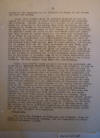
|
15.
March 24, 1922.
"Confidential Report on Political Conditions in
Nicaragua & Honduras," Lt. Col. J. K. Tracy,
U.S.M.C., p. 15.
" . . . tation by
the Americans to the officers in charge of the
troops who took the mounts. ¶ 16.a. This respect
shown to American citizens is not accorded to
all citizens of other foreign countries in
Nicaragua and Honduras. Several instances were
brought to my notice in which the property of
foreigners other than Americans, had been
destroyed or stolen by Government forces and by
revolutionists; the claims for reimbursement of
this damage are still unadjusted. The implicit
trust and faith in the protection which the
American flag accords to anyone under it, was
very well illustrated to me while in San Marcos,
Honduras, during a time when fighting between
the governmental and revolutionary forces was
going on all about the town. In San Marcos,
Honduras, there is an American citizen named
John Abadie, born in Santa Barbara, California.
He, in common with all the other foreigners in
this town, kept his country’s flag continually
flying over his house. He informed me that every
night his place was occupied by, from 15 to 50
natives of the town, who came there to sleep for
protection. On one evening he informed me, a
town policeman slept there. He has in his house
at present, some 50 or 60 boxes containing
property of various Honduranean [Honduran]
citizens of the town of San Marcos, Honduras,
who have placed them there for safe-keeping. ¶
16.b. This respect which is shown towards the
personnel and property of American citizens in
Nicaragua and Honduras, is due in part to the
fact that most of the Americans who have settled
in these countries, are above the ordinary type
in intelligence and that all their dealings with
the natives of these countries are honest and
fair. In addition, there undoubtedly exists a
universal feeling that should American citizens
or their property be molested, the United States
Government would intervene and take over certain
functions of the governments of Nicaragua and
Honduras. The bug-bear of intervention of the
United States Government in the affairs of these
two countries, is feared by most of the leaders
and by those who exert the greatest influence
over the mass of people. In the large cities of
Nicaragua and Honduras, and particularly with
those natives who can speak English and from
whom perhaps many opinions are formed, there
exists a feeling and desire for interference by
the United States Government in the affairs of
these two countries. The majority of the
citizens of Nicaragua and Honduras, however, are
bitterly opposed to any intervention on the part
of a foreign power, in the affairs of these
countries regardless of the material benefits
which would accrue, and would probably forget
party strife and all band together in
opposition. ¶ CONCLUSIONS ¶ (a) Along the
frontier of Nicaragua and Honduras, there is
little or no governmental control, and the
formation of revolutionary movements against . .
. "
|
|
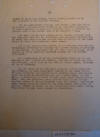
|
16.
March 24, 1922.
"Confidential Report on Political Conditions in
Nicaragua & Honduras," Lt. Col. J. K. Tracy,
U.S.M.C., p. 16.
" . . . either of
these governments, can be readily carried on in
the territory of the opposite country. ¶ (b) The
maintenance of large army forces along the
border is causing extremely heavy drains on the
financial resources of both countries,
particularly Honduras, where I estimate the
present cost of its border army to be $2,000.00
a day. ¶ (c) Under the present conditions it
appears probable that the disorders that are now
occurring will continue indefinitely, or until
some change in the present form of control of
the armed forces of these two countries, takes
place. ¶ (d) As has already been stated, it is
believed that the revolutionary movements in
Honduras will assume serious proportions at any
moment. In Nicaragua, for the time being at
least, there appears to be no concerted movement
against the established Government. ¶ (e)
Practically all of the disturbances which are
now occurring in the Republic of Honduras, and
some of which are felt in Nicaragua, may be laid
at the door of Carlos Lagos, Minister of War of
Honduras. ¶ (f) The power of the governing
parties, both in Nicaragua and Honduras, is
based upon their control of the armed forces of
those countries and without their soldiers these
governments could not maintain themselves even
for a short time. In Honduras, particularly, in
order to keep these armed forces satisfied, they
are permitted great license which is one of the
greatest causes of dissatisfaction among the
people. Were these armed forces properly
officered and disciplined, they could be greatly
reduced in number and the supervision they would
receive would cease to make them a cause for
discontent. . . . "
|
|
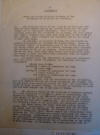
|
17.
March 24, 1922.
"Confidential Report on Political Conditions in
Nicaragua & Honduras," Lt. Col. J. K. Tracy,
U.S.M.C., p. 17.
" . . . APPENDIX 1 ¶
Notes on Certain Military Features of the
Republics of Nicaragua and Honduras. ¶ 1. The
military forces of the Republic of Nicaragua
consist of some hundred men in the capital which
are well uniformed and of excellent appearance.
These men act as the personal guard for the
President and garrison, the fort called the
“Loma”, situated on a hill some half mile to the
south of the capital. Their officers are
untrained and do not appear to have much force.
¶ In addition, as occasion arises, the
government organizes detachments of soldiers for
special duty. These detachments consist of
ununiformed men of the lowest class who are
given rifles and sent out without training under
officers who exercise little or no control.
These hastily organized forces are only armed
mobs which cause much discontent among the
people as they are often only partially paid and
commit many acts of brigandage. ¶ In August
1921, the Government of Nicaragua purchased from
the United States Government, the following
military equiptment [equipment]: ¶ 10,000 Krag
Rifles ¶ 6,000,000 Rounds of ammunition for same
¶ 50 Lewis guns ¶ 1,000,000 Rounds of ammunition
for same ¶ 6 Field pieces, 3” ¶ 600 Rounds of
ammunition for same ¶ 2 Aeroplanes ¶ This
equiptment [equipment], with the exception of
the aeroplanes, has been divided between the
towns of Managua and Granada, but it has never
been generally issued for use. The aeroplanes
are still in their original boxes. The matter of
engaging an aviator has been delayed due to the
lack of funds. ¶ 2. The military forces of the
Republic of Honduras consist of a well organized
presidential guard in Tegucigalpa, the capital
of Honduras, and of small detachments in all
towns (the number of the latter I was unable to
obtain but estimate it to be not over three
hundred men. The government figures are probably
larger as the pay-rolls are generally padded.) ¶
All these forces are armed with old rifles,
mostly single shot “Remingtons”. At the present
time the soldiers are being paid and uniformed.
No attempt is made to either train or discipline
these forces except the Presidential Guard
referred to. The officers are openly threatened
and abused by their soldiers. Drunkenness is
almost universal and abuses of the inhabitants
continually practiced. The number of officers in
the Honduranean [Honduran] army is all out of
proportion to the number of enlisted men. At
Choluteca, the army paymaster told an . . . "
|
|
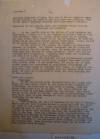
|
18.
March 24, 1922.
"Confidential Report on Political Conditions in
Nicaragua & Honduras," Lt. Col. J. K. Tracy,
U.S.M.C., p. 18.
" . . . Appendix 1 ¶
[…] American informant of mine, that out of the
two hundred names on his payroll, one hundred
and sixty men were officers, this latter number
probably included non-commissioned officers. ¶
Character of the country along the southern
border between Nicaragua and Honduras. ¶ 1. On
the Pacific side of the divide of both Honduras
and Nicaragua, a great part of the country is
pasture land or very open forests. There is
little thick brush and no jungle. For some
twenty miles north of the Bay of Fonseca, the
land is level and in the rainy season almost
impassable. Water, except in the larger rivers,
is of a doubtful character. ¶ To the north of
this plane, the country is very mountainous and
broken. The climate excellent and the rains not
very heavy in the wet season. Here the mountains
are covered with open pine forests or large
pastures. Good water can be obtained most
everywhere. Sanitary camp sites are available
and good beef cattle can be obtained. ¶ The
people of the lowlands are not particularly
warlike and would probably not resist very
strongly any armed forces sent against them. In
the mountains, the people are of much better
physic and accustomed to continuous revolutions
and more resistance might be expected from them.
In Honduras particularly, this might be expected
from the indians [Indians] from Texiguat, who
have the reputation of being the best fighting
men in that country. ¶ Roads and trails. ¶
Nicaragua ¶ 1. In the dry season motor
transportation of a light sort might get some
thirty miles to the north of the railroad at
Chinandega, and from Leon as far north as Limay.
Pick and shovel work might have to be done. The
trips referred to, could be done in daylight
during the dry season. Bull carts can go as far
north as Ocotal. All other transportation would
have to be done by pack animals of which there
are plenty available, mostly mules. ¶ Honduras ¶
2. From Amapala, the port of Honduras on the Bay
of Fonseca, small gasoline boat transportation
is available over the shallow water to San
Lorenzo. From San Lorenzo there is a fine
automobile road to the capital of the country,
Tegucigalpa, and a truck of seven tons capacity
can make the eighty-five mile trip in one day.
From San Lorenzo, motor transportation can
generally get through to Choluteca, except
during the rainy season when the roads are so
muddy as to make them impassable, and the
crossing of the Choluteca River becomes a
problem even for mounted men. From Choluteca
north there are no roads and pack animals must
be used. . . . "
|
|
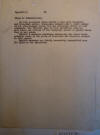
|
19.
March 24, 1922.
"Confidential Report on Political Conditions in
Nicaragua & Honduras," Lt. Col. J. K. Tracy,
U.S.M.C., p. 19.
" . . . Appendix 1.
¶ Lines of Communication. ¶ In both countries
there exists a very good telephone and telegraph
system. Telephones connect only a small number
of the very largest towns, but the telegraph
system is very extensive. The official maps of
both countries, however, note lines and offices
of the telegraph system in places where they do
not exist. ¶ Exhibit 2 contains notations
indicating the lines which actually exist in the
parts of Nicaragua and Honduras covered in this
report. ¶ English messages are fairly accurately
transmitted over the lines by the operators. . .
. "
|
|
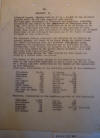
|
20.
March 24, 1922.
"Confidential Report on Political Conditions in
Nicaragua & Honduras," Lt. Col. J. K. Tracy,
U.S.M.C., p. 20.
" . . . APPENDIX 2.
¶ Attached hereto, (Marked Exhibit 2) is a
sketch of the district covered while on the duty
reported upon herein. ¶ The best maps obtainable
in Nicaragua and Honduras, including an official
map issued by the government of Nicaragua made
in 1921, were found to be so inaccurate as to be
of little or no service. These maps are very
faulty in the location of many towns; they
contain many notations of telephone lines and
offices where they do not exist, and the
spelling of the names of many villages is very
inaccurate. ¶ The Boundary between Nicaragua and
Honduras is in dispute in several places, but
there is no place along the border where the
local inhabitants have not adjusted this matter
among themselves and cheerfully accepted one or
the other of the Governments. This boundary as
accepted by the local inhabitants has been noted
on the sketch hereto attached, by a dash and
cross dash line: ---‘---‘---. ¶ The route taken
during the time covered in this report is noted
by a dotted line: ---------. ¶ The number of the
people living in the immediate vicinity of most
of the locations mentioned is noted below and
can be taken as a fairly accurate indication of
the denses of the population in that locality. ¶
Nicaragua, (Commencing at the southern portion
of the boundary): ¶ Chinandega 10,000 ¶
Campusano 50 ¶ Somotillo 500 ¶ Sauce 500 ¶ Las
Pilars 40 ¶ Achuapa 175 ¶ Cinco Pinos 200 ¶ San
Francisco 150 ¶ San Juan de Limay 400 ¶ Potasti
10 ¶ El Rhoine 5 ¶ Somoto Grande 1,200 ¶ Cyote
10 ¶ Totogalpa 250 ¶ Ocotal 1,400 ¶ Macuelizo
150 ¶ Ocoona 25 ¶ Coyolar 50 ¶ Santa Marie 60 ¶
Jicaro 25 ¶ Honduras. (Commencing at the
southern portion of the boundary): ¶ Choleteca
[Choluteca?] 6,000 ¶ San Lorenzo 375 ¶ Cacamuya
25 ¶ Jayacagan 25 ¶ Banquito 20 ¶ San Marcos 500
¶ Duyure 20 ¶ Oropoli 100 ¶ Guinope 750 ¶
Yuscaran Several Thousand. ¶ Paraiso 30 . . . "
|
|
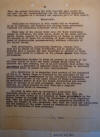
|
21.
March 24, 1922.
"Confidential Report on Political Conditions in
Nicaragua & Honduras," Lt. Col. J. K. Tracy,
U.S.M.C., p. 21 (end).
" . . . Note. The
orders directing the duty reported upon herein
do not call for any recommendations and the
following memorandum has been prepared as a
distinct and separate part of this report. ¶
Memorandum. ¶ Conditions as outlined in this
report and as observed by me in Nicaragua and
Honduras are causing large government deficits
and increasing discontent among the people. ¶
While many of the causes which make for these
conditions cannot be corrected, the main issue,
which is the armed governmental forces, appears
to be susceptible of change by placing the
control or at least the direction of these
forces in the hands of disinterested
persons-notably military officials of the United
States. ¶ Both governments, particularly
Honduras, realize that they are in danger of
being overthrown, and it appears very possible
that a request for such direction or control of
their armed forces could be obtained at the
present moment from these governments. ¶
Organizations similar to those at present in
control of the military forces of Haiti and
Santo Domingo would bring the quickest and best
results, but it is not believed that either the
government of Nicaragua or Honduras would be
willing to surrender sufficient power to permit
of such organizations. ¶ As a substitute it is
suggested that certain of the personnel of the
U. S. Marine Corps be detailed by the President
of the United States and commissioned by the
Presidents of Nicaragua and Honduras as officers
in the armed forces of those governments, in
sufficient number so that the actual instruction
and control could be carried on by this
personnel. There is no military material in
either country to work from and a complete
reorganization would be necessary. ¶ In order to
make such an arrangement successful the
following should be inserted in any agreement.
1st. That the control of such forces as are
detailed to these governments by the United
States be directly under the Presidents of these
Republics. 2nd. That the disbursment
[disbursement] of all funds in connection
therewith be under the control of such
personnel. 3rd. That the rules and regulations
for the control of the armed forces be
formulated by and inforced [enforced] under the
direction of such personnel. ¶ J.K. Tracy."
|
|
|
|
|
|
|
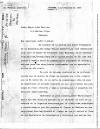
|
February 4, 1924.
Letter from Dr. Rosendo Chamorro, Granada, to
U.S.M.C. Major John Marston, Managua, p. 1.
"Dr.
Rosendo Chamorro. ¶ Granada, ¶ Nicaragua, C. A.
¶ 4 de Febrero de 1924 ¶ Señor Mayor John
Marston ¶ U S Marine Corps. ¶ Managua. ¶ Muy
apreciado señor y amigo: ¶ En ocasion de la
muerte del señor Presidente de la Republica, don
Diego Manuel Chamorro, en cuya administracion
tuve el honor de colaborar como Ministro de la
Gobernacion, Policia, Gracia, Justicia, y
Cultos, recibi de Ud. una muy atenta y amable
carta de pesame, cuyos conceptos de estima y
amistad para con migo, fueron confirmados por su
apreciable misiva de año nuevo. ¶ Un poco de
balsamo pusieron en la profunda herida que la
muerte de Diego me causara, los altos elogios
que de él hacia Ud. en su carta de pesame; pues
ella me puso de manifiesto el elevado concepto
en que le tuvieron las personas de recto
criterio y amplio corazon, que le juzgaron con
absuluta imparcialidad. ¶ Permitame en esta
ocasion, señor Mayor, expresarle mis mas
efusivas gracias en su caracter de Jefe de la
Guardia de la Legacion Americana, por la
disciplina, moderacion y cordialidad, de que dio
pruebas el Cuerpo de Marinos en sus relaciones
diarias, durante el tiempo en que yo estuve al
frente del Ministerio de Gobernacion y Policia,
y que hablan tan . . . "
|
|
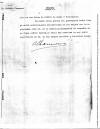
|
February 4, 1924.
Letter from Dr. Rosendo Chamorro, Granada, to
U.S.M.C. Major John Marston, Managua, p. 2.
". .
. alto de sus dotes de hombre de mando y
disciplina. ¶ Haciendo votos porque Ud.
permanezca mucho tiempo entre nosotros, para
satisfaccion de sus amigos que le apreciamos
como Ud. se lo merece, y deseandole en compañia
de su digna señora esposa, un feliz año nuevo,
me es muy grato suscribirme de Ud. su muy atento
servidor y fectisimo amigo."
|
|
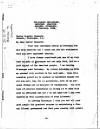
|
February 9, 1924.
Letter from U.S.M.C. Major John Marston,
Managua, to Dr. Rosendo Chamorro, Granada, p. 1.
"THE MARINE DETACHMENT, ¶ AMERICAN LEGATION, ¶
MANAGUA, NICARAGUA, ¶ 9 February, 1924. ¶ Doctor
Rosendo Chamorro, ¶ Granada, Nicaragua, C.A. ¶
My dear Doctor Chamorro: ¶ Your very courteous
letter of February 4th has been received and I
thank you for the sentiments that you have
expressed therein. ¶ I have always considered
you one of my very best friends in Nicaragua and
not only that, but as a good friend of the
American people. I am leaving Nicaragua next
Saturday. My orders detaching me from my present
duty arrived in the last mail. Upon this
occasion permit me to express my heartfelt
thanks for all you have done for me personally,
both as my personal friend and as Minister of
Gobernacion. You have been of material
assistance in aiding me to make this post an
efficient one and I do not know how I can ever
express my full appreciation of your interest. ¶
In leaving Nicaragua I wish you and all your
good people the greatest success in maintaining
a free and liberal government and that your
country will permit . . . "
|
|
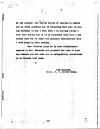
|
February 9, 1924.
Letter from U.S.M.C. Major John Marston,
Managua, to Dr. Rosendo Chamorro, Granada, p. 2.
" . . . my own country, the United States of
America, to assist you in every possible way in
achieving that end. ¶ In saying farewell to you
I feel that I am leaving behind a very dear
friend and it is my heartfelt wish that I can
return some day to renew the pleasant
associations that I have found in this country.
¶ Mrs. Marston joins me in most affectionate
regards to Mrs. Chamorro and yourself and also
to your son Rosendo and his wife who so
delightfully entertained us in Granada last
week. ¶ JOHN MARSTON, ¶ Major, U. S. Marine
Corps."
|
|
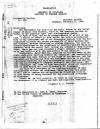
|
February 11, 1924.
Letter from J. A. Urtecho, Ministry of Foreign
Affairs, Managua, to U.S. Minister John E.
Ramer, Managua (translation).
"TRANSLATION ¶
REPUBLIC OF NICARAGUA ¶ MINISTRY OF FOREIGN
AFFAIRS ¶ Diplomatic Section ¶ No. 100 ¶
NATIONAL PALACE. ¶ Managua, February 11, 1924. ¶
Excellency: ¶ The Government has notice of the
early return to the United States of Major John
Marston, Chief of the American Marines attached
to the Legation under your distinguished charge.
¶ In view of this, and as an accomplishment of
an act of justice, I desire to record in this
letter the entire satisfaction both of the
Government and of our Nicaraguan society with
the distinguished military and social
personality of Major Marston who has enforced,
without resorting to extreme measures, the most
efficient discipline in the detachment of
American Marines which he commands, with the
result that, during his command of this military
force, there has not been recorded a single
instance of disorder or of any conflict with the
authorities of the Republic. ¶ Furthermore,
Major Marston, inspired by the existence of the
close cordiality existing between our countries,
has successfully encouraged this same feeling in
the minds of his Marines, and has impressed all
Nicaraguans with the sentiment that he is not
only a military commander but also an attache of
your Legation who follows and cultivates with
laudable sincerity and efficiency, the same
sentiments and ideas of Your Excellency, which
are characterized by good wishes and loyal
friendship for Nicaragua. ¶ Let this be a
testimony of the high appreciation of that
distinguished officer and gentleman, Major
Marston, who knows so well how to combine his
obligations as friend and soldier, in form
worthy of being recorded for the people and
Government of Nicaragua. ¶ Permit me, on this
occasion, to renew to Your Excellency the
assurances of my highest and most distinguished
consideration. ¶ (signed) J. A. URTECHO. ¶ To
His Excellency Mr. John E. Ramer, Minister ¶ of
the United States of America to Nicaragua – ¶
Legation. ¶ C O P Y"
|
|
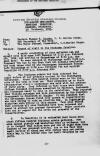
|
February 18, 1924.
"Report of visit to the Honduran frontier."
Captain Thomas E. Burke, U.S.M.C., to the
Secretary of the Navy, Washington D.C., p. 1.
"UNITED STATES MARINE CORPS ¶ THE MARINE
DETACHMENT, ¶ AMERICAN LEGATION, ¶ MANAGUA,
NICARAGUA, ¶ 18 February, 1924. ¶ From: Captain
Thomas E. Bourke, U. S. Marine Corps. ¶ To: The
Secretary of the Navy. ¶ Via: The Major General
Commandant, U.S. Marine Corps. ¶ Subject: Report
of visit to the Honduran frontier. ¶ 1. A party
consisting of four enlisted men and myself with
side arms left Managua at 1:15 p.m. February
6th, 1924, and arrived at Chinandega at 5:00
p.m. the same date. We were delayed at
Chinandega until 9:00 a.m. February 7th due to
the fact that all animals available had been
taken over by the Nicaraguan Government forces.
Left Chinandega at 9:00 a.m. February 7th and
arrived Somotillo at 2:00 p.m. February 8th. ¶
2. The Honduran rebels had been informed the
night before of our probable arrival by the
Nicaraguan Government. About five hundred rebels
were on the outside of the town to meet us. They
conducted us to their headquarters where a
conference was held with the leaders of their
party. They informed us that there were about
fifteen thousand Hondurans assembled in
Salvador, Guatemala and Nicaragua ready to join
in the revolution. They reported that vicious
outrages had been perpetrated by the Honduran
Government on followers of Carias. It was
reported that the Government forces fired into
crowds of Conservatives who were trying to vote
on election day. In Tegucigalpa sixty-two were
killed in this manner. They also stated that
convicts all over Honduras have been released
and armed to protect the present Government.
These convicts have had no regard for the lives
and property of the Conservatives. ¶ 3. In
Somotillo it is estimated that there were about
fifteen hundred Honduran rebels gathered. Few
arms except pistols and machettes [machetes]
were in evidence, but it is thought that rifles
were put out of sight when they learned of our
proposed arrival, due to the fact that small
parties of armed men with rifles were met making
their way to the border over the trail followed
by our party. . . . "
|
|
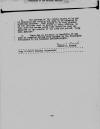
|
February 18, 1924.
"Report of visit to the Honduran frontier."
Captain Thomas E. Burke, U.S.M.C., to the
Secretary of the Navy, Washington D.C., p. 2.
" . . . ¶ 4. The leaders of the rebels appear to
be men of education and ability and seem to be
animated by patriotic motives. They seemed to be
very pleased of the interest that we showed in
their affairs. In fact when the marine party
left Somotillo they all gathered on the outside
of the town and yelled, “Long live America.” ¶
5. There was no evidence in Somotillo of any
arms or supplies having been shipped by the
Nicaraguan Government to the Honduran
revolutionists. ¶ THOMAS E. BOURKE. ¶ Copy to
Major General Commandant."
|
|
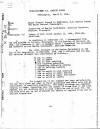
|
1.
April
3, 1924. "Inspection of Marine Detachment,
American Legation, Managua, Nicaragua."
Major General Joseph H. Pendleton, U.S.M.C., to
the Major General Commandant, Washington D.C.,
p. 1.
"HEADQUARTERS U.S. MARINE CORPS ¶ Washington,
April 3, 1924. ¶ From: Major General Joseph H.
Pendleton, U.S. Marine Corps. ¶ To: The Major
General Commandant. ¶ Subject: Inspection of
Marine Detachment, American Legation, Managua,
Nicaragua. ¶ Reference: (a) Orders of MGC, dated
January 18, 1924, 0753-1&2, AN-87-acd. ¶ 1. In
obedience to reference (a), I disembarked from
the USS ARGONNE at Corinto, Nicaragua , on the
morning of February 16, 1924, and proceeded by
rail to Managua where I inspected the personnel
and materiel of the Marine Detachment, American
Legation. ¶ 2. The total strength of the Marine
Detachment on the day of the inspection 16
February, 1924, was 5 officers and 114 men. The
enlisted strength was distributed as follows:- ¶
84 men in ranks ¶ 14 men on guard ¶ 2 men in
sick quarters ¶ 2 men legation orderlies ¶ 1
Commanding Officer’s orderly ¶ 4 men on saluting
battery ¶ 2 messmen ¶ 1 man on watch in sick
quarters ¶ 2 men on watch in radio station ¶ 1
man on watch at water sterilizer ¶ 1 man on
watch at corral ¶ 3. The inspection of the
command was very satisfactory. The men were
clean and neat in their appearance and their
arms and accoutrements in excellent condition.
The khaki clothing was somewhat varying in
shade, depending upon the number of times that
it had been washed, but all uniforms were in
good condition and of good fit. The men were
well set up and evidenced the effect of regular
drill and excellent dispipline [discipline]. . .
. "
|
|
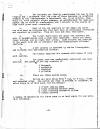
|
2.
April
3, 1924. "Inspection of Marine Detachment,
American Legation, Managua, Nicaragua."
Major General Joseph H. Pendleton, U.S.M.C., to
the Major General Commandant, Washington D.C.,
p. 2.
" . . . 4. The barracks are ideally constructed
for use in the tropics and I recommend that the
plan of these barracks be carefully studied by
the Quartermaster’s Department, as, in my
opinion, they would be, with possible slight
changes, as satisfactory for semi-permanent use
as could be constructed; and I believe in the
course of time would prove most economical. ¶ 5.
Part of the old quarters of the Campo del Marte
are also used as barracks and they have been as
thoroughly overhauled and repaired as possible.
They are cool and well ventilated. ¶ 6. The
toilet facilities are ample and sanitary and
were in exceptionally good police when
inspected. There are seven flush toilets, and an
eight foot urinal. Also toilets are supplied in
the guard room and in officers’ and
non-commissioned officers’ quarters. ¶ 7. A new
laundry is operated by native Nicaraguans, and
performs very satisfactory service. ¶ 8. The
baker supplies the command with bread of very
good quality. ¶ 9. The guard room was
comfortably convenient and well policed. The
guard of the day consists of ¶ 1 Sergeant ¶ 3
corporals ¶ 1 musician ¶ 9 privates ¶ 10. There
are three sentry posts. ¶ 11. Drills are held
daily from 7 a.m. to 8 a.m., close and extended
order. One period per week is devoted to
ordnance, of which there is at this post, the
following:- ¶ 2 3-inch landing guns ¶ 4 heavy
Browning machine guns ¶ 12 light Browning
automatic rifles ¶ 3 Stokes mortars ¶ A supply
of ammunition for these guns is on hand ample
for any probable emergency. . . . "
|
|
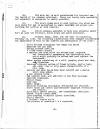
|
3.
April
3, 1924. "Inspection of Marine Detachment,
American Legation, Managua, Nicaragua."
Major General Joseph H. Pendleton, U.S.M.C., to
the Major General Commandant, Washington D.C.,
p. 3.
" . . . 12. The sick bay is well constructed
for tropical use, the health of the command
excellent. There are twenty beds available and
expansion in emergency is easily possible. ¶ 13.
The store rooms were in good police; the stock
was well cared for and is maintained in ample
quantity and proper proportions for service at
this station. ¶ 14. Public animals appeared to
have been properly cared for; as also the
vehicles, horse drawn and motor propelled. ¶ 15.
Between June 1, 1922, and the date of
inspection, February 16, 1924, the following
construction work changed considerably the
appearance as well as the comfort and
usefullness [usefulness] of the post:- ¶ Tiled
ditches throughout the Campo del Marte ¶
Magazine and gun shed ¶ Moving picture pavilion
¶ 3 tiled tennis courts ¶ A machine gun nest
built for educational purposes, but incidentally
commanding the surrounding area which might
possibly be seized and used against the
detachment. ¶ Water system consisting of a well,
pumping plant and tank, and firemains. ¶
Sewerage disposal system of flush toilets,
septic tank, and sewer line to city sewer
three-fourths of a mile long. ¶ Galleys and mess
halls have been rebuilt and a galley store room
added. ¶ A new laundry built. ¶ The Lejeune
Club, and addition to the Post Exchange ¶
Gasoline dispensar [dispenser]. ¶ Pistol range.
¶ Sick Bay. ¶ Rifle Range. ¶ Barracks building
thoroughly overhauled and repaired. ¶ Store
rooms and entire Quartermaster compound
overhauled and rebuilt. ¶ Electrical system
rebuilt, new transformer installed. ¶ Street
lights established. ¶ Intercompound telephone
system installed. ¶ Corral rebuilt. ¶ 2 handball
courts built. ¶ The porches of quarters 1 & 2
repaired. . . . "
|
|
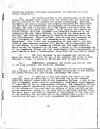
|
4.
April
3, 1924. "Inspection of Marine Detachment,
American Legation, Managua, Nicaragua."
Major General Joseph H. Pendleton, U.S.M.C., to
the Major General Commandant, Washington D.C.,
p. 4.
" . . . Additional barracks buildings
constructed, of concrete and tile, before
referred to. ¶ 16. The funds allotted to the
construction of the foregoing were expended most
wisely with the result that the enlisted men and
two officers of the command are housed
comfortably. Supplies, equipment, and public
animals are properly sheltered and facilities
are available for instruction and amusement
which have greatly increased, and tend to
maintain in a high degree, the efficiency and
contentment of the whole detachment. In my
opinion the results obtained reflect excellent
judgement and foresight displayed by the
Commanding Officer, Major Marston, in planning
the improvement of the post, and untiring
attention to details of construction by the Post
Quartermaster, Captain McClean, both of whom are
deserving of, and I recommend be given, the
commendation of the Major General Commandant.
Also I will note as deserving of much credit,
the services of Quartermaster Sergeant W.V.
Harris, who is deservedly held in high esteem by
the Commanding Officer and Post Quartermaster.
After noting the character of his work, I concur
in the recommendation of the Commanding Officer
and Post Quartermaster that Quartermaster
Sergeant Harris be made a Quartermaster Clerk
when the opportunity comes. ¶ 17. The Post
Exchange is well managed and carries an ample
and varied stock for the use of the command. The
stock on hand February 1, 1924, is valued at
$6,687.30; cash on hand $1,158.12. ¶ 18. The
Barber, shoemaker, and tailor pay ten per cent
to the post exchange, and stand all expenses. ¶
19. The Lejeune Club, an extension of the Post
Exchange, has a library of 500 books with an
average circulation of 300 volumes per month,
writing and game tables, phonograph and piano. ¶
20. In addition to the Club within the limits of
the compound, there is maintained by the
enlisted men of the command, under the careful
supervision of the Commanding Officer, a club in
the City of Managua, which would be considered a
creditable establishment if conducted for and by
commissioned officers. The Commanding Officer
exercises careful supervision over this club and
I was informed by all of the officers at the
post that the effects of this institution had
proven excellent. During all the time that it
had been running, there has never been a
particle or [of?] disorder or disturbance in the
club; but, on the contrary, the enlisted men of
the command take a pride in the institution and
make it not only respectable but commendable. .
. . "
|
|
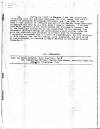
|
5.
April
3, 1924. "Inspection of Marine Detachment,
American Legation, Managua, Nicaragua."
Major General Joseph H. Pendleton, U.S.M.C., to
the Major General Commandant, Washington D.C.,
p. 5.
" . . . 21. During my visit to Managua I had
the opportunity of talking with the American
Minister, Mr. J.E. Ramer, and with a number of
prominent Nicaraguan officials, and I am glad to
say that a high opinion of officers and men of
the Marine Corps stationed in Managua was held
by all with whom I came in contact. I believe
that Major Marston by his broad-minded and
diplomatic conduct, and by the excellent
discipline he has maintained in his command, has
succeeded in establishing and maintaining a most
cordial relation with the officials and citizens
in private life in Nicaragua. I earnestly
recommend that a letter of commendation, for his
services in this regard, and for the neergy
[energy], good judgement, and tact which he has
displayed, be written to Major Marston by the
Major General Commandant. ¶ J.H. PENDLETON. ¶
Copy to: Major Marston, M.B. Quantico, Va. ¶ The
Commanding Officer, Marine Detachment, American
Legation, Managua, Nicaragua, C.A."
|
|
|
|
